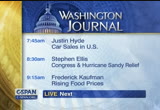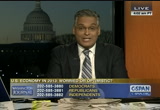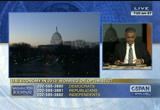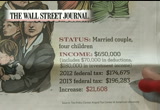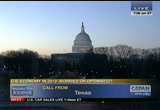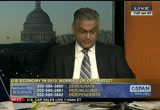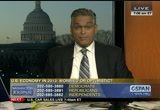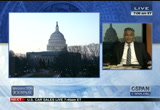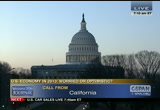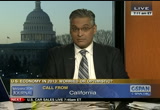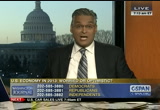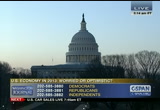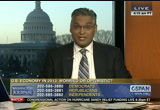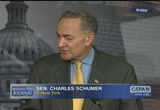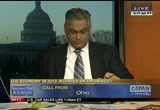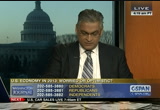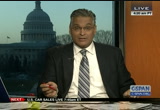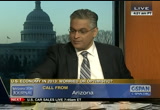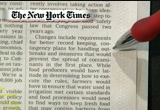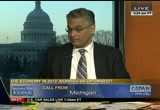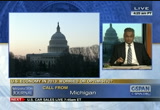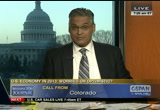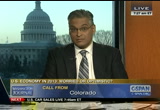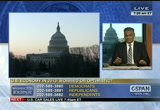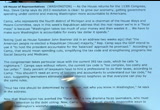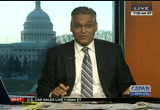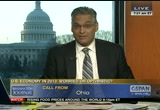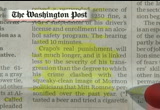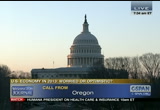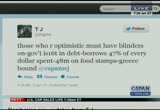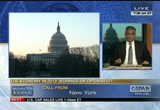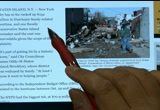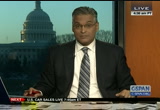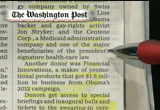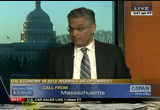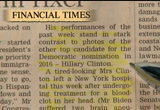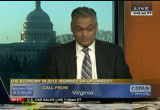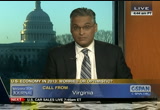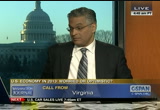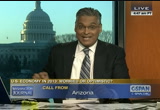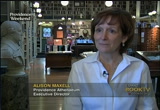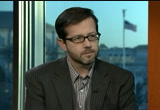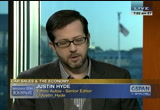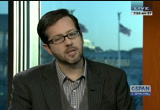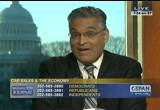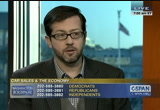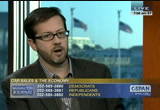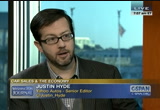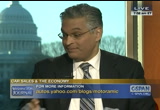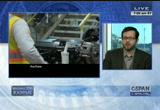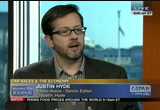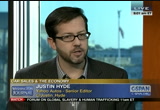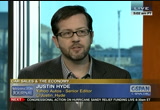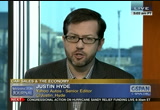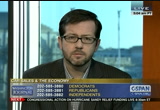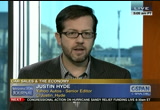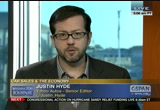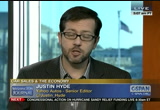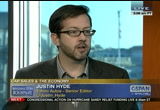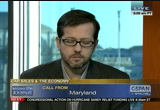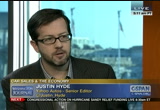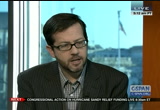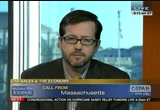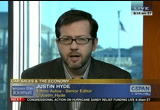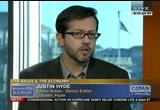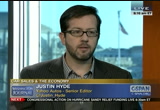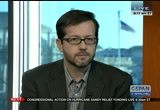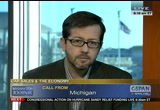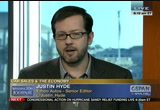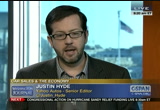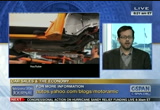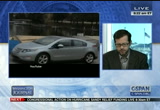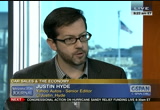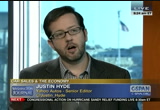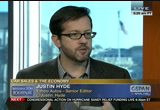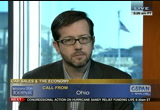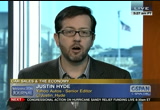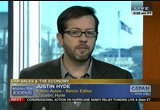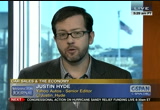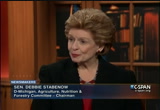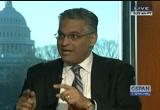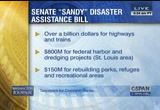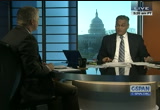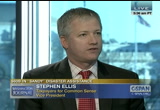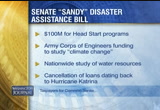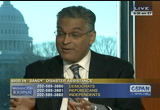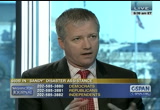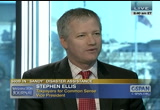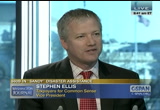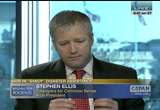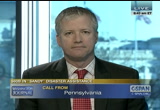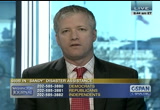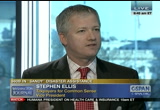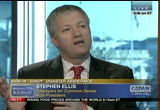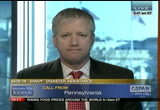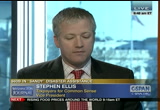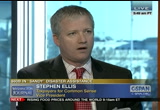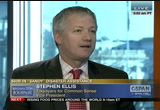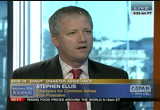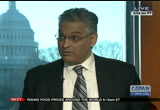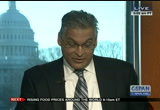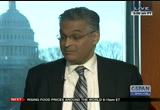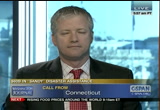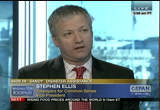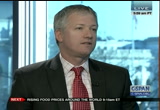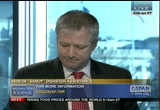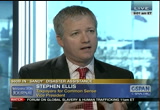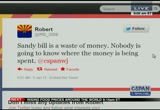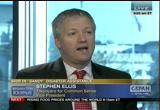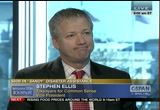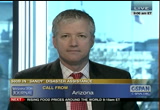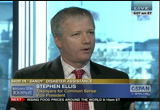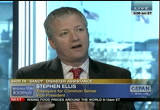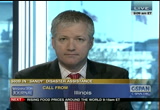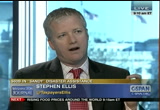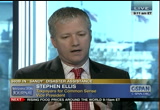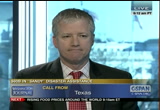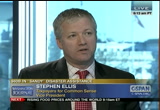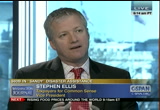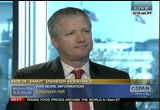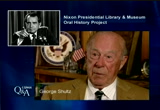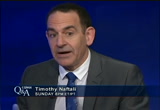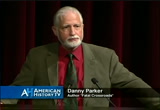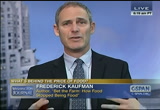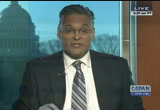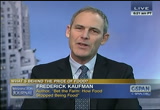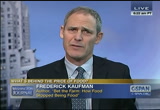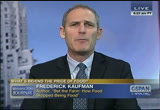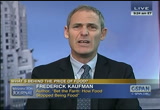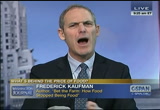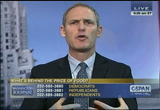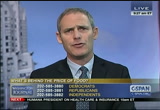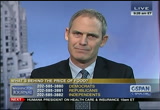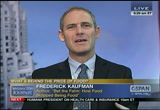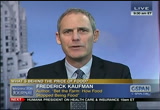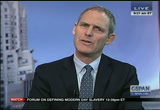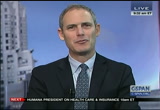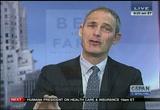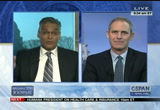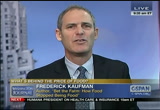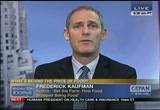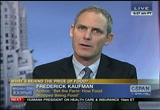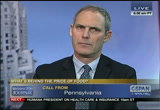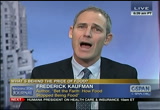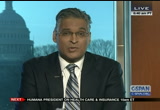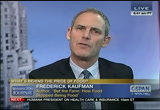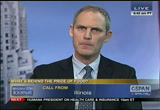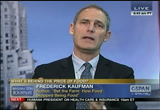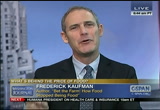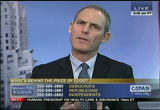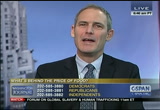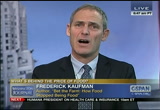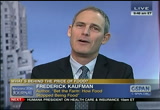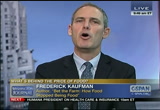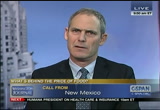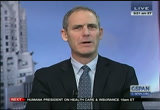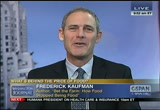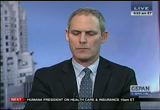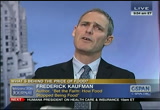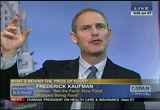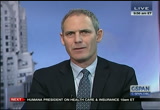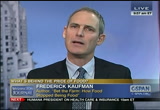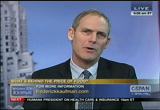tv Washington Journal CSPAN January 5, 2013 7:00am-10:00am EST
7:00 am
on car sales in the united states. later, frederick kaufman host: good morning. it is "washington journal" for january 5. the first 45 minutes we want to get your take and outlook on the economy for the year ahead. this comes as the jobs report from yesterday highlights 155,000 jobs added in december. a couple headlines when talking about that report used the word "worried" but other stories suggest a rebound in the stock market and housing industry. with these stories your take on the economy for 2013. specifically, are you worried or optimistic? here is how you can weigh in.
7:01 am
by calling. if you want to reach out on social media, you can do so off of twitter. 15 saying worried, 10 optimistic and you can send an e-mail. the headlines were the inspiration for the question. when it comes to economic related matters the "wall street journal" on the jobs record. tepid job growth fuels worry. we will highlight the use of the word "worry." and in "new york times" job creation is still steady despite worry. they talk about the jobs report. turning to wall street and stock
7:02 am
market, here is the financial times take, wall street ends at highest level since the financial crisis. other stories talk about wall street saying wall street ends with a bang. if you want to look at the housing industry another indicator when it comes to the economy, the real estate section of the "washington post" this morning framework for renaissance is how they talk about a story looking at a reis surgeons not only -- resurgence in building and buying. we will read some of the stories as we go along. we want to frame the question to you about the economy for 2013 and your thoughts on it, if you are worried or optimistic. if you want to call, 202-585-3880 for democrats.
7:03 am
202-585-3883 for republicans and 202-585-3882 for independents. we have several people weighing in on facebook at facebook.com/c-span. this is off twitter. worry, my job could be gone in a few months. that is one of the opinions about worried or optimistic about the economy. this is new york, new york. anthony, democrat line weighing in on saying that he is worried about the economy. tell us why. caller: i'm very worried about the economy because if you look they say jobs have been added but it is the same percent of unemployment and if jobs are added how is it the same percent? and i would like to make a comment on i feel very worried about the way the economy is going because i have seen tax increases on my family and my family makes less than $50,000 a
7:04 am
year. host: you will see payroll tax increases or other increases? caller: my whole family is receiving tax increases and we make less than $50,000 a year. like a household income and how can you continue to tax people more than what we have? it is hard for us to live the way we are now and then they keep taxing and taxing. but the rich never get taxed like we do. host: what is your job story? what do you do and other earnersearn ers in the family do? caller: i'm in construction and my mom is in healthcare because she is a home health aid. she just seen $20 in taxes and she is paid weekly and that was just that welcome, $ -- week.
7:05 am
host: so you bring in about $50,000. caller: yes. and everyone who received a check has increased taxes. host: that is anthony from new york worried about the economy. reach out to us on phone, twitter, facebook, about your optimism or worry. the caller mentioned taxes and weekend investor section of the "wall street journal" there is a breakdown of how taxes will be amongst particular earners. it shows various categories. this is the one for married couple with four children. they estimate say they bring in $650,000 which would include $70,000 in deductions and $180000 for investment amount. their tax to be $74,000, 2019, $196,000 various categories. it is in the weekend investor
7:06 am
section. worried or optimistic in the economy? bel air, texas, david is worried. he is on the republican line. good morning, david. caller: good morning. host: tell us why you are worried about the economy. caller: it is not just that i'm worried. i believe that the economy is collapsing and it will from the government down. and i don't believe that measures are being taken to deal with spending. the federal government for all intents and purposes is legally bankrupt. our credit rating has gone down. we are number seven in world competitio competition. are happening. how are they going to generate revenue to pay off that debt? i don't see a solution there. we are borrowing from a communist country to pay the interest on a debt we can't pay. no one thought this would ever happen. and the end result is going to be some sort of collapse.
7:07 am
chaos. civil unrest. host: when it documents -- comes to your personal situation worried or optimistic? caller: i'm 57. i have had my share of ups and downs. but i have never seen anything like this. i'm not concerned about myself so much. it is just that you look around and there are so many homeless people and people without work now. that is my concern. host: cindy off twitter adds this. optimistic adding that slow improvement beats going backwards. up next is jim from chicago, independent line. he is worried about the economy. caller: good morning. i'm very negative about the economy because number one there's no jobs creation from the private sector or government. federal reserve continues to print money which
7:08 am
means inflation is down the road. had jobs f people these jobs are not giving out any good benefits or a decent wage that. is a problem. where is the government going to get revenue? you can't continue to go after the rich because eventually they will run out of money. if people are not working where is the revenue going to come in? host: talk about your own personal situation. caller: i turned 55 in september. i have a nice pension and my own savings and no debt. so myself i'll fine but i'm concerned about young kids, my neighbor and people who are clueless. a lot of people put their faith in the government and. host: whether did you do? caller: i was a counselor. most people can't work more than
7:09 am
five or 10 years because people do not want to keep their employees that long. host: about 20 comments on the facebook page but there is a poll. category for worried or optimistic. if you are watching television you will see 21 said they are worried about the economy and 13 saying they are optimistic. some of the comments here is mark who says he is neutral when it comes to the decision. i can tell you 90% are worried. anthony said very worried with two exclamation points and 51 out of 100 voters voted to move forward with a far less progressive ideology. other comments from facebook are there and give us a call. whether you are worried or optimistic about the economy. caller from memphis on the democrat line. i think maybe our first call that is on the optimism scale. caller: [no response].
7:10 am
caller: let's go to morris, san diego, california. republican line. caller: hi, pedro. first of all, i was stunned that obama was re-elected but i'm pessimistic about the nation's economy and future of it. but for my own personal standpoint i'm optimistic about my situation. i have been unemployed a little over two years and i was under the impression i would get 99 weeks in california. but because of the formula i only got 70-something and it is long gone. but i learned during the last couple of years that california used to be almost impossible to get permanent disability but now there's attorney services advertised on tv to say they won't charge unless you get a reward from disability. and they say there are ways to
7:11 am
get it in california that you are probably not aware of. so i'm going monday to check that out. and i think that i'm a republican, of course, but i may join the democrats now. i'm for the welfare society and entitlements. i'm going to get permanent disability and be set for life. host: when you look at how you gauge whether you are worried or optimistic as a whole what do you look at? what factors do you look at? caller: unemployment is really high. we are getting taxed to death. and it will only get worse. obama care was a disappointment to me. i cannot believe the supreme court upheld the mandate on that. but things will get better for me in california with permanent disability. i will make more monday on disability than when i was working. host: this is the headline from "wall street journal" 7.8%
7:12 am
unemployment rate announced yesterday. saying that the latest jobs data indicated little potential for accelerated hiring. growth is expected to continue at a moderate 2% barring new shocks to the economy, prospect for stronger upturn the first half of 2013 remain slim. many economists worry about losing more ground especially if lawmakers launch a battle over raising the federal debt ceiling. brooksville, florida. randy joins us, independent line. for those worried about the economy. caller: yes, sir. what worries me the most is they keep making all of these free trade agreements and that sends the jobs overseas. if they would start -- stop all the free trade and start taxing the imports that come in, all the jobs would start coming back and it would create millions of jo
7:13 am
jobs. just get rid of all free trade agreements and taxing. thank you. host: why do you think fixing that will, or adjusting that will automatically improve the economy? caller: it would cost a company so much more to import their products that they would rather build them here. that with bring back jobs. host: do you think there is long-term impact that would happen on companies and how they run a business, whether they can keep performing at the same rate or would have to cut staff, et cetera? caller: no, sir. it would create more jobs because it would be here to -- all the products would be manufactured here and they will sell them and it would be cheaper in the long run. host: louisville, kentucky, john is optimistic on the democrat line. caller: good morning. i'm optimistic about the long-term of the economy but the
7:14 am
sho short-term i'm pessimistic somewhat because of the debt ceiling we are going to approach here in a couple of months. it is going to be interesting to see what happens in congress. but it is really silly to argue over that issue because this is money that has already been appropriated and spent. they can control what they spend going forward, there's also going to be a battle over continued funding of the government in march and on the short term i'm pessimistic. but i agree with the caller from florida about we need to create jobs with good pay and benefits. from what i have read i understand that 60% of the jobs that are being created are not even subsistence type wages.
7:15 am
so, from the little bit of economics that i know, countries that prefer cheap goods have cheap labor and basically it gets dragged down to the point where the imports come from countries like germany, which have high labor and high costs of goods are the ones that have a sustained economy. host: that is john from louisville, kentucky, on the democrats lane. "philadelphia inquirer" and other stories talk about the house vote on the $9.7 billion approved for flood insurance programs for the members that are -- some members taking to the floor talking about the vote and talking about the debate over the flood insurance program overall. senator schumer was quoted saying we should not have paraded down the street because the ma major work of helping th victims much sandy is still
7:16 am
ahead of us. bit more from e senator schumer yesterday talking about votes taken or lack of vote by paul ryan on the house bill and getting his comments. [video clip] >> flood insurance is an obligation of the federal government. in other words, people who pay flood insurance have paid hundreds and sometimes thousands of dollars a year and in return the federal government says if you are flooded we will reimburse you for the damage you suffer. so i don't understand why anyone would not want to vote for that provision. i haven't heard congressman ryan's reasoning. >> [inaudible]? >> that is just terribly harsh to a homeowner who lost his home. should they sit around and wait two years and lose their lives until we reform the promise? in is nothing wrong reforming the program but to hold the
7:17 am
homeowners who desperately need this money and have paid in for this money as almost hostage to reform? that is unconscionable. that is wrong. and i would hope congressman ryan would reconsider. host: senator schumer from yesterday. you can see the full exchange if you want, several news conferences took place available on our c-span website. you can watch the whole event. back to calls on whether you are worried or optimistic about the economy, rex from dayton, ohio, line, good morning. go ahead. caller: yes, good morning. i wanted to say this and i have been saying it the last couple of weeks. any business in the united states that has employees that does tphnot do their job are le go. what i say is let's let the
7:18 am
congress go. i want to say go home. every one of you go home. we have people that can replace you. you are not doing your job. you haven't done it for four years. you are stalemated and it is a recurrence of the fiscal cliff every few months is a ridiculous situation. it is bringing damage to our country and it is time to get off the pot so to speak. now, the only way i can think to do that is the american people join and get a majority of the vote and seriously kick them off the seat. there are people ready to take their place. let's get people in there to get something done. host: we're talking about the economy and whether you are
7:19 am
optimistic or pessimistic. call us and let us know. facebook, there are 33 people so far into have contributed to our poll saying they are worried about the economy. 22 people said they are optimistic. beverly spence from twitter says she's modestly optimistic. she can't believe the g.o.p. blow the u.s. and global economy. john, redford, michigan, independent line, optimistic. caller: how are you doing. i'm very optimistic. i will tell you why. because the political climate is changing. the tea party and republicans will go to the wayside of dinosaurs. people are starting to see the and billionaires can puff all they want it the media. come the election in 2014 there
7:20 am
will be more democrats and progressives and it is time to let go of the past. all the old presidents and all that crap. host: but if you get more progressives how does that make you more optimistic? caller: because the masses and people that want to work and work hard. they are seeing some light at the end of the tunnel. it is time to leave the old ones behind. host: do you think the progressive specifically in congress are accomplishing that? caller: yes, they are. they are laying the foundation and i see nothing but a good future, finally, finally, after 30 years of reagan we are moving forward. host: the "washington post" in their real estate section looks the housing industry. here is whether they write. the writer says a housing renaissance has begun. it may be hard to believe after the six-year crash in home sales and construction and house home
7:21 am
prices but housing turned a corn last year and it will take off in 2013 driving this optimism is one certainty. owning a home has never been as attractive. such a home buyers have two sets of decisions. first, determine whether they can afford to make a purchase, then they determine whether owning is a better financial choice than renting. are the costs of owning a home lower than the costs of renting? that is from the "washington post" in the real estate section. scottsdale, arizona, tkaeufdavi democrats line. optimistic. stkpwhra i would like to say as an optimistic person with the economy and touch base on one of your previous callers, all flood insurance is issued to fema, the federal government. you can purchase it through them by going to their website or
7:22 am
talk to your own agent. i would suggest that people do that and that might quicken the result to the sandy situation. host: ok. before you go, you are optimistic about the economy. tell us why. caller: as americans we know what we need to do and we just need to get out and do it. shop, shop less at the big box stories and go to specialty stores. buy stuff that is grown or built in your areas and support those that will support you back. get ahold of your agent. host: double stories in the papers reflecting this story from the "l.a. times" that president obama is expected to nominate chuck hagel to be defense secretary officials said setting up a confirm atiation be critical of his views on israel and iran. officials said he had not
7:23 am
formally offered the job but others familiar said it could come monday. also this morning, a story on the f.d.a. new changes and decisions from the f.d.a. specifically when it comes to food safety. here is stephanie strong the lead story in the new yo"new yo times" saying they proposed two sweeping rules to prevent contamination of produce and processed foods. the rules represent a sea change to the way the agency polices food a process that currently involves taking action after contamination is identified. it is a long awaited step for codifying the law congress passed two years ago. changes include requirements for better record keeping, contingency plans for handling outbreaks and spreading them. food providers would have latitude to execute the rules and farms would have to ensure
7:24 am
water and irrigation and processors would find ways it keep fresh food. kathy, good morning. she is joining us from linesburg, michigan, on the republican line, worried about the economy. caller: good morning. i want to say that i just tkpgoy first paycheck of the year and now i have $50 from the paycheck to spend. host: because of the payroll tax cut? caller: because of the payroll increase, the 2% and cost of medical insurance went up that much. we've cut or staff back tremendously where i work. and i think our government needs to get a wake-up call. it is kind of our own fault because we live in a society of democra
7:25 am
democracy. we didn't mind sharing what away made with others less fortunate. but now it has become -- it is no longer taking a little bit. we gave them an inch and they took 10 hundred thousand miles seminars i as far as i'm concerned. raise.utomatically get a i won't get a raise because there is no money for a raise. host: now that you have received your first paycheck, now that you have seen that there is money missing, how do you adjust as far as budgets are concerned at the house? caller: have to go without some more things. my husband, he's worked in construction and their business, the place he worked at the last four years, has hardly ever been able to get a job. he will qualify for social security in april, thank goodness. and you just make due.
7:26 am
but i think so it is very unfair to have put the middle working class people pretty much out of work or having to work so much that you don't get to enjoy life like anybody else. host: cortez, california, dave, independent line. caller: hi. host: how are you? caller: i'm from colorado. host: colorado, sorry. go ahead. mi my bad. caller: i'm optimistic. i live here in colorado and a marijuana grower so that is a good thing. it is funny you mentioned california, there was a guy who called from california and said he will be happy being on disability. month on gets $700 a
7:27 am
disability, that is no way to live, you know? the problem is that corporations that are making the money are not paying the wages. there are so many people looking for the jobs that they have that they are lowering their wages and there are no benefits. so even when people get jobs it is not enough to support them for, you know, we need to raise up the bottom wages. when brazil did that it helped. it was a little tough on the businesses but it brought their economy like hugely. and just by letting them share their wealth a little bit. we are not asking for much. $60 job but you have to pay like $20 or $30 for a job. and it is like people are only making like $7 and they raise the tax 2%. what does that come to? a dollar a person? it is just ridiculous. but i'm real optimistic because
7:28 am
colorado is a great place to live. host: when you look at your optimism how much do you base that on specific actions by the federal government? some have mentioned concerns about a fight on the debt ceiling and some mention government in other areas. specifically do you look at what happens in washington as an indicator of whether the economy will be good or not? caller: that is big thing for me now because the final word on legalization of any take place of marijuana we are going to start growing it and it keeps going until 2014 and there are not many people that grow legalization ofhemp. kind of an old guy and i had temporary disability and 50-some years old and i waited long enough in a trade that i did know became a commodity out here. so, for me like the wages went
7:29 am
way up and everything got good. but the federal government is without doubt broke, and we need that fixed. but we have to stop the war on drugs. there are jobs out there for a green economy and it is not just growing marijuana. there is other work. we have to grow hemp so we can use ethanol. host: we will leave it there. there is a press release from the office of house ways and means here is what he has to say as part the release. as the house returns he says it is 2013 resolution is clear to grow our economy. there is a little more from the release from this week he makes the republican response to the president's weekly address and he talks about the role of spending. [video clip] >> the simple truth is aware in this mess because washington
7:30 am
takes too much of your money and wastes it. that is the real problem. it needs a real solution. we have to make sure washington is accountable for every tax dollar in spends. we have to make sure your money is spent efficiently and effectively. unfortunately, the spending problem is getting worse not better. under president obama we have had four straight years of trillion dollar deficit. the national debt is over $16 thlg. we are crushing today's small businesses and next jigs of americans under a mountain of debt. we are selling their future and our country's financial independence to china. host: u.s. economy in 2013 are you worried or optimistic? loretta is from cleveland, ohio, democrats line. host: hi, pedro. how are you today? host: i'm well, thank you. caller: i'm very optimistic. the reason why i'm very optimistic is because of the way the republicans come out there and they trot this class
7:31 am
warfare. have gotten richer the past 50 years. the republicans are protecting the rich and the american people see through what is going on. romney hasn't paid any taxes and he wanted to run the tax for america. the republicans are protecting the military contractors and their have had billions the past couple of years. it is really kinds of strange to watch this go on, because -- host: with that you are still optimistic? host: because the people are waking up. the republicans have outsourced all the jobs, then they want to cut the poor people's social
7:32 am
security. the kids with school lunches and they call themselves christians. this is what really got me cracking up laughing. host: if the republicans are waking up as you say what does that mean ultimately as far as your faith or at least your optimism of the economy? stkpwh caller: my optimism is for 2014 and 2016 republicans are going to be out. they are old, antiquated, they are racists. they are stop being the progress of the country. we are beyond that. host: that is loretta from cleveland. the "washington post" has a story taking a look at senator mike crapo who pleads guilty to drunk driving. he entered the public's conscious as the mormon senator who drank vodka tonics on the night of december 22, climb no a
7:33 am
car and took a half hour drive and in alexandria where he ran a red light and scored a .11 on a breath test. the arresting officer noted blood shot eyes. on friday morning the 61-year-old man wearing a gray suit took a seat with a staffer and other defendants it alexandria district court and called before the judge and pleaded guilty and received a suspended sentence of 180 days in jail, $250 fine and year suspension of his driver's license and enrollment in an alcohol safety program. the hearing was 10 minutes. his punishment will be longer than the degree to which his crime clashed with the squeaky clean image of mormon politicians. jefferson, oregon, next, john joins us on the republican line. he says he is worried. tell us why. caller: i'm worried because we
7:34 am
have the same president and congress and even ben bernanke said in his last meeting that he has unemployment is going to be high until about 2015 and the 10-year note is going up. that means inflation. i watch the stock market all the time. the stock market is rising, yes. but i think that is a false rise. we need to start paying down this debt. otherwise, we are going to be going right into greece, just like greece. host: you talk about the stock market. you said it was a false rise but there are headlines this morning saying that wall street, one said highest level since the financial crisis. caller: well, yeah.
7:35 am
you go back to 1929 and the day before the stock market crashed it was the high est it had ever been. they can draw that money out any time they want. and all it is going to take is one little twist and we've got in march all of these other things we need to deal with. we've got the debt ceiling. it seem likes every three months we are having one problem after another. how can you build confidence on this? host: t.j. doesn't express confidence in his tweet. he said government is in $16 trillion of debt and borrows 47% of every dollar spent. $48 million on food stamps. then greece bound.
7:36 am
staten island, new york, joe on the independent line who is worried about the economy. caller: hello. how are you doing? i'm optimistic and worried. host: ok. tell us why. caller: the reason i'm worried is even though the job high for december supposedly was up, it is only up because december is a very strong month as far as needing jobs. we will see january. january you will be seeing a lot of layoffs that will occur. as far as we need jobs. the economy is great and we are building houses like crazy. the main thing is creating jobs. if people are working, people are happy. host: tells about your personal situation. where do you fall in the worried/optimism camp? caller: i'm worried because i don't see jobs in the future, i
7:37 am
don't see anything happening. you see people as far as hurricane in new york, a lot of people are on tv but they are hurting. they are going without heat and without electric, and they pass a $9 billion -- they passed it yesterday and it is disgusting the way that the economy is right now and how long they are making these people wait for money, you know. even though they do get their money, i mean as far as work goes it is just not happening. host: there's a story this morning saying that the city has racked up by $154 million in hurricane sandy related overtime and one fiscally kefr lly conse lawmaker said it is unavoidable. it was part of being hit by a
7:38 am
historic storm. his district was walloped by sandy. at least i know it went to helping people. talk in the debate from capitol for hurricane relief, sandy funding specifically where you sit from new york. caller: well, i mean as far as the money that is being used in staten island? host: i'm concerned about the debate over funding for hurricane sandy relief as a new yorker how you look at it from where you sit about what goes on in washington, d.c. caller: well, i mean right now there's no money -- i mean people haven't received any money. so, people are staying with families and in hotels. until we actually see the people getting the money maybe it will create more jobs. host: that is joe from staten island, new york. a couple of stores about the
7:39 am
inaugural. one writes inaugural party gets corporate donations. he writes president obama will have some major corporations such as microsoft and at&t to thank for the festivities this month. according to a list of events donors released mr. obama banned corporate donations for the 2009 inauguration and democratic convention in charlotte last year but he announced after the re-election that he was removing the objections this year for the ceremony and surrounding events. such corporate correspondence including a biotechnology, streamlined circle and centene one of the major beneficiaries of the president's signature health care law. another was financial innovation a maker of promotional products that got $1.8 million in
7:40 am
business from obama's 2012 campaign. another story in the "wall about journal" talking hotels and the like in washington, d.c. and how they are planning. the headline says that scaled back inauguration loses an appeal. elizabeth williams says his 2009 inauguration drew an estimated 1.8 million to washington more than any other gathering on the to onal mall according officials. the main tourism marker. this week d.c. transportation tourism officials say they expect it to be less than half that at 600,000 to 800,000 and turnout for any second inaugural is smaller the committee's decision to cut the number of officials balls from 10 to two and put the kibosh on the mall concert has affected people coming. monson, massachusetts,
7:41 am
democrats lane, optimist. hello. caller: hello, we are alive. my answers are basically with social security and medicare. the government, you know, is claiming it is the biggest hraeubl liabilities. wonder why they haven't taken away the limits people pay into social security and medicare. host: so you are worried about entitlements overall? caller: right. well, i mean, the government, i would believe, should keep on taxing people for social security and medicare for as much money as they make instead of the $110 limit. that would stabilize social security and medicare. host: do you think entitlements play a large part of the economic health of the country? host: of course. that is what everybody is
7:42 am
worried about, about paying for all of this. and me being retired and my wife retired, we rely on our social security. host: that is ted from massachusetts, a profile of the vice president this morning in the financial teams -- times. he is being called a capitol hill fixer. they are writing that countering such perceptions the report from mr. biden he has not ruled out making another run for the presidency in 2016. although he will be 74 he is in good shape and works out regularly. his performances of the past week are in contrast to the other top candidates in 2016 hillary clinton. tired looking clinton left a hospital after undergoing treatment for blood clot. brain en suffered two aneurisms.
7:43 am
mrs. clinton can rebound. if she recharges her batteries and does some remarkable things around the world for women as expected. he says she will be very hard to beat. mike from woodstock, washington. he is on the independent line. he is both optimistic and worried. hi, mike. caller: good morning, sir. i'm from woodstock, virginia. host: woodstock, virginia. sorry. >> i'm a ninth generation virginian and former government i.t. contractor. i'm both optimistic and pessimistic. these are my thoughts. one, the president doesn't control the budget. the constitution specifically says that the budget is controlled in the people's house. two, the president can send a wish list to congress, but that is just what it is. and he does have to negotiate. it is the house's responsibility
7:44 am
to come up with the budget, pass it, run it through the senate, get them to agree or compromise and send it to the president. if he doesn't like it, he sends it back. they can override him with a two-shirts majority. that is in the constitution, too. as an independent, going all the way back to mr. reagan, who ran on smaller government but yet a government increased with the democratic congress more than any other president and the debt went up 186% more than all 39 combined before him. a lot of people don't realize that a lot of the debt is interest that we are having to pay. and to say that the current sitting president is responsible for $4 trillion of deficits under his watch, that is true, but what has the opposing party done? and, finally, if you look at
7:45 am
what so-called reaganomics has done and taxes being fair or not, where has the job creation been from getting those tax breaks? if you look at the facts when we talk about entitlements, yes, did we have to look at that as g.d.p.? yes. but the tax is one of our biggest g.d.p. factors and we can't be the world's policeman. we have interests we have to protect but we have to scrutinize them carefully. also, foreign aid packages, we have to take care of our people at home first. look at job creation numbers and the current sitting president's tenure and they have gone up where they were going down. host: i have to leave it there. he's from virginia. joy cook from twitter says this.
7:46 am
she is optimistic because she sees more millionaires and entrepreneurs. 49 people at last count said they were worried about the economy, 39 said they were optimist optimistic, not sure of how many have contributed thoughts this morning. but you can continue to do so as we go through the day and continue on. also on twitter if you want to keep the conversation going there. our last call for this segment is black canyon city, arizona, on the democrats line. for those expressing optimism this is natalie. hello. natalie, are you there? caller: yes, i'm here. host: you are on. go ahead. caller: yes, i am worried but still optimistic. just because i hear many negative things coming from all my friends. but i still think i'm optimistic just because everything is going
7:47 am
on right now i still think obama -- i [inaudible]. host: are you employed? caller: i'm employed. i'm a bartender. i go to school. i'm a student. i still keep going on doing what i'm doing. host: what are you studying? caller: i'm a paralegal. i'm going on to do paralegal. host: when do you graduate? caller: april. host: what do you think about your job prospect when you graduate in april? host: i still think that i'm going to have a job once i graduate and keep going on. host: that is natalie from black canyon city, arizona. we have been talking about the last 45 minutes or so about the economy in 2013 and if you are worried or optimistic about t. just because we have stopped doesn't mean you have to stop.
7:48 am
if you want to go to our facebook page or participate in the poll or comment and sometimes also the conversations take place a life of their own on twitter. we will turn to another aspect of the economy. one that showed pretty good results, car sales in 2012. we will talk about not only the actual sales but their contribution to the economy with justin hyde of yahoo auto. later steven ellis from the taxpayers for common sepnse wil look at the sandy emergency bill the $60 billion bill that has troubles because of things that were added to it as far as projects and some people call it pork. we will look at that with stephen ellis later. first we want to let you know hat if you turn to book tv and american history tv you can see the work of our local content vehicle. they travel around the country talking to people and finding
7:49 am
interesting places to give you not only a sense of the places they are visiting but how they play out historically and through their literature. providence, rhode island, is the focus of this weekend january 5 and 6. we will learn about the history and literary life to give you a sense of what is going on with the network as far as specifically what you can see you will visit the providence local landmarks that have served the community. information go to look at c-span.org. here is a sense of this feature on providence. take a look. [video clip] >> to climb up those steps and make your way in and to arrive at the top of the steps and look in and see the mezzanine filled with books and the busts is inspaoeurpg.
7:50 am
-- inspiring. i love when we have visitors for the first time. they walk in the front door and usually if it is someone who is new to the building the first thing i here is a giant ah! then the next word is oh, my goodness. this is what a library should look like. and part of what i find sometimes overwhelming but totally gratifying is this institution has existed for hundreds of years and every day when i come in to work i get to contribute to history. it is this wonderful unique library and cultural center in the historic section of providence. we are one of about 17 membership libraries that still exist in the country today. i'm actually proud to say the providence is one of two that exist in rhode island. we have a sister organization
7:51 am
that actually predates us in newport and that is the redwood library. the word athenaeum comes from the greek idea of learning and it is fitting that our architecture is based on the greek revival style. but it was a place where people came to converse and talk about their ideology, their theology, their learning, their science, explorati exploration. it was really a convening place for learning. it still is today. >> "washington journal" continues. host: we will look at car sales now and how they contribute to the economy. justin hyde from yahoo auto joins us. we have been talking about optimism or worry in the economy. how have car sales contributed?
7:52 am
. right now car sales are probably a big source of optimism. they ended 2012 up about 13%, 14.5 million new cars and trucks sold across the country. the projection for the industry continue into ticontinu 2013. they were up across the board. pretty much every auto maker and type of people had some kind of increase. there was a lot of people coming in the market during the recession, a lot of people held on to their cars and let them get older than they normally would in the recession. the average age hit a new high of about 10 to 11 years. there were a lot of people still out there who need to replace an aging vehicle that is expected to drive demand. the other thing has been two things. one is unemployment has been dropping steadily, not as fast as some would hope but it is dropping and that is bringing more back into the workforce and giving them income to get the
7:53 am
vehicles they need to get to work. the other thing is interest rates, the majority of people a car orrow money to buy and with low interest rates that has allowed banks and dealers to craft deals more can afford. it is not unusual to hear a payment that goes to six years and rates are subsidized for some cars to get them off the lot. so as far as sales go it is pretty optimistic. host: as far as the buyer is concerned is it easier to buy? they have access to credit and banks lending more as far as concerns about past credit history and things like that? guest: unlike the housing industry where there was a great crash in the recession due to a number of bad loans the auto industry has mostly been able to keep ahead of issues of bad buyer.or of a troubled and be more precise how it lends frptd it is easier to repossess a car than a house unfortunately
7:54 am
for some folks. so, when a loan goes bad the au auto industry is adept at minimizing the losses. as far as buyers are concerned if you have a good credit buyer out there right now there is a lot of competition for the business. not just from banks but the finance companies that provide honest to dealers and auto makers such as general motors allied financial. host: if you want to talk to us about car sales and their contribution to the economy and maybe tell us your story if you bought a car this year call us on the numbers on the screen. you can send us a tweet at cspanwj and e-mail at journal at c-span.org.
7:55 am
we are looking at car sales. you talked about total sales and if you look at the information in the national association of auto dealers g.m. was on top about 2.3 million cars. this was sales through november of 2012. was this part also of what happened as far as the government investment in g. phfpm. too? guest: there is factor as much as g.m. exists. it and chrysler wouldn't be around in the government had not intervened. has been the largest auto maker and will remain for some time to come. that said g.m. did lose market share this year. big gainers this the surge of 2012 sales were honda, toyota and chrysler because honda and toyota were both coming back from 2011 where they lost a lot of sales due to the effect of the tsunami and earthquakes in japan that hit production. they came back with not just more available cars but better cars, better models. they climb back into the market
7:56 am
in a way they were not able to do in 2011. chrysler had the biggest gain among the detroit three auto makers. push for new l models opening up new dealerships and being much more aggressive on sales. g.m.'s market share slipped a little bit versus 2011. and while it had a very good december, was able to rebound from a fairly rough november where it had its truck sales expand due to some incentive actio action, its profits have been fairly strong. it is a very profitable auto maker. going in 2013 will be a key year for measuring how well g.m. has come back since the bailout t. will have the launch of its most profitable product in terms of pickups and those will be key to measuring how well the new g.m. performs. host: an observation saying car dealerships are loaded with cars that were overproduced and now they are sitting there gathering
7:57 am
dust. inventories are fairly healthy. guest: the typical way of measuring inventory is by days of buy which is sort of a measure of sales versus how many are on dealer lots. in the industry it is typical to have about 60 days supply for any given month. at the end of the year they tend to swell because they have produced a bunch of new model sreubgs and they will dwindle down the three or four months so inventories are a little high but at the moment they are not what one would say historically oversold more than years past. there have been not that many years ago it was not uncommon for a detroit auto maker to have 90 days of supply. last month g.m. had a 120-day supply of the old versions of pickups and there was concern for financial types and wall street and people who watch it. at the end of december it fell back to 86. they will have a shutdown where
7:58 am
they won't produce as many trucks until they get the new ones on line. that is more in line. at the moment i don't think there's a great concern about at least inside the industry about inventories being too high. host: justin hyde contributes to the motor blog. tell us about it. . it is blog where we compile a lot of original stories, things about the industry and car buyers and car enthusiasts and try to make bridge between things that kpoeut excite us and people who may not be interested in cars every day but find other parts of the business and vehicles exciting. host: our first call is from mount sterling, kentucky, independent line. this is make. caller: yes, i pt want to comme on the automotive industry and down here in kentucky things are really looking good.
7:59 am
host: how so? caller: we are hiring people every day. all last year we were hiring people just about every day to wo work. but we had trouble keeping people here because it is a hard job and nobody wants to work. guest: he is right. you go down through the south sort of the i-75 corridor there's been something of a boom in auto production where a lot of factories from foreign auto makers and toyota planned in georgetown that keeps expanding. a lot of foreign auto makers, especially japanese have been in the production united states so they do not have to be as worried about fluctuation in currency with the yen. as it rises and falls it can make a major impact on profits. they find that it is much more
8:00 am
profitable to build in the united states by expanding some plants. as well are staffing up and there is expectation that volkswagen may add to that new plant in chattanooga, tennessee. advocat volkswagen wants to expand up to a million vehicles a year in the united states. there is some expectation they can't unless they put on a new building. host: and observation says g.m. sales up to government were up 79% but guest: fleet sales are still an important factor. they can make up as much as a third of total sales depending on the auto maker. in the past fleet sales were seen as a pressure release valve of sorts. they were considered unprofitable sales, a way to keep the factory running even when you didn't have enough demand from customers. after the bailouts and the cost cutting of the past couple years that view has changed a little bit. fleet sales have a bit of profit now.
8:01 am
and the companies don't have nearly as much unused factry capacity, which is the profit killer in the auto industry. so these sales are seen as not as much of a burden as they once were. host: turn around the economy from the auto worker. what's it looking like employment wise within these major companies that build cars? guest: employment's been pretty strong. the industry added manufacturing jobs, auto dealerships added jobs. the job level is not up nearly where it was before the crash of 2008. there's still about 780,000 americans unemployed in auto manufacturing. there still is a chance for extended employment. you can't get to the sales figures that they're expecting without bringing in some kind of more production from some place and that has a trickingdown effect through the port suppliers through the rest of the food chain but i think auto workers are to some degree worried about the same thing that is the rest of us are.
8:02 am
now that we're past the fiscal cliff, americans are going to have to worry about the payroll tax increase. that's a worry at the top end in terms of who is going to buy cars. it's a wor >> for everybody how it's going to affect their income. and the workers of today do not have the same path of increasing earnings year over year as they did in the past. the bailouts, the cost-cutting have at least for now permanently lowered their earning potential going forward, a lot more of their increases come in one-year bonuses tied to company profit rather than wage increases. so there will be a chance to get jobs and as mike from kentucky mentioned they're hiring but they're difficult jobs and their benefits and pay are not going to go up as quickly as in the past. host: joe from miami, florida. democrat's line. caller: one thing you mentioned's worries me, the idea of secure car loans.
8:03 am
i look at that as buying a car that you really can't afford. three years above living because of these bad economic times, you can end up with an upside down deal in a few years. guest: that's true. and that is a lot of concern for a lot of customers. if you stretch out a loan for much longer you're going to end up owing more on a car than it's worth. and if something goes wrong you're in a mess of pain. that said, i think a lot of people have somehow been able to fin es it by being comforted in the idea that they can hold on to the car much longer. the average car lasts longer and is a lot more durable than just a few years back. i think the real issue becomes when you get to used vehicles whether it is a smart idea to kind of have a much longer term on a used car that's going to be worth less. the average new car sells for about $30,000 so we talk about it as an important part of the economy it is a luxury
8:04 am
purchase. host: republican line. jim, hello. caller: hi. . i've got a couple of comments maybe on the negative side. i know justin is being very positive about the industry. i came out of that industry 37 years. and what i see coming in the future is these higher fuel economy standards that are being imposed by our government by 2020. we've talking well into the 50 mile per gallon fleet average requirement by our government. and i believe -- i look upon our government as not only trying to tax the industry, but are also imposing these regulations on the industry. as opposed to foreign economies like in japan, for example, the government really gets behind the auto industry and helps them in terms of financial aid, and they impose tariffs on imported cars to keep outsiders
8:05 am
from imposing on their economy. their government is acting on the better behalf of the auto industry. ours on the other hand seems to be negative. but -- host: we'll leave it there. and he started off with what are cafe standards. guest: right. and the few economy standards are set to rise steeply between now and 25e. to jim's point. those standards are pretty historic and they can hit some pretty high numbers. up even into the 40's. the problem comes in the way the numbers are talked about here in washington. the number on the top of a cafe standard is not a real world figure, it's a laboratory figure and it's not what you see on the window sticker. when you talk about where the vehicles are actually going to have to go, it's much lower and not quite as dramatic. some vehicles on the road today already meet those 25e standards. that sate -- 2025 standards. a lot of new vehicles coming
8:06 am
out now through 2015 will have most of their improvements devoted to meeting those fuel economy requirements. detroit auto show is here next week. i guarantee you meeting fuel economy will be the top line goal of any new model that rolls out on to the floor. to your point about what government doss or don't do, as tough as the united states is on auto makers here to cafe rules, the fuel economy requirements around the world are no easier, in fact they are tougher in europe and japan than they are here. there is really no choice for the auto industry but to make their vehicles burn less gas as time goes on. if it wasn't for cafe rules, it would be the price of gas pushing them that way anyway. we just had a year where gas prices hit an all-time high. they are expected to rise again in 2012. the average is 24 miles per gallon. that will go up over the next several years by rules and customers pushing them.
8:07 am
foreign governments take different views of the industry depending on who you talk to. you mentioned japan. the japanese do take a lot of concern about the health of their auto industry. it's a major exporter, a major part of the economy. that said there's a lot of friction in japan. you've had executives of auto makers telling the japanese government that if it didn't weaken the yen, they would have to ship jobs overseas in order to keep their profitability and i don't think that's a statement that an american auto executive could get away with here. someone from detroit came to ben bernanke said you've got to weaken the dollar or we're going to ship jobs to mexico the backlash would be immense. they tend to provide a lot of jobs, tend to provide a lot of exports and be a big contributor to the overall health of the mick. -- middle class.
8:08 am
cars will be lighter, a lot more technology in them. there will probably be some kind of electric system that helps them drive in some fashion not neffspli a full hybrid but they for example when you go to a stoplight the engine will shut off and when you pull away it will turn back on. you'll see cars air dineically smooth, a lot more exotic materials not just traditional iron and steel but carbon fiber or trick pieces of arrow dynamic technology like shutters that close when the car's on the road. i'll give a random example. a full-sized ram pickup has an eight-speed transmission. a few years ago that's almost unherd of. it's almost double because it needs to meet the tougher fuel standards. host: are there concerns about balancing the fuel efficiency standards if they're lighter to the safety standards that cars have to be while driving on the
8:09 am
road? guest: there are concerns and it has been a long-standing concern. there are some experts that contend that any amount of lightning of vehicles is going to lead to a decrease in safety just by sheer physics. there's another school of thought that says there's enough technology and we know enough about how crashes work and how to disburse the energy from a crash that you can make vehicles safer and lighter at the same time if you know how to build them properly. host: independent line. go ahead. caller: i bought a car this year first thank you for c-span. i'm a c-span junky. but i bought a car this year and i really wish that i hadn't because some of these newer cars are very expensive to fix. they have computer chives chips. and if you buy it from a second rate auto dealer or your credit is not that great they jack up the price and they jack up the interest rate and you end up
8:10 am
under water with cars that cost more than your car note is to keep on the road. host: could you tell us what you bought and what you paid for it? caller: i bought a 2008 chrysler sea breeze and i paid about 12,000 for it . host: so your monthly works out to about what? caller: about $300. guest: and that is a concern. you're right. buying a car is still can be a very complicated very opaque process. you have to be individual lint pretty much at every step of the way to make sure that you're getting the kind of deal that you can afford at the end, and that doesn't mean just the price on the car, that doesn't mean just the monthly payments. that means looking at the terms of the loan, looking at how the interest payments spread out, looking at the interest rate and your collateral and trade-in value. it can be very tough and it does take a lot of preparation on the part of the consumer to make sure that when you come in
8:11 am
you're getting the deal you want when you walk out. host: the top five vehicles sold through november 2012. the top was the f series truck. guest: these are the traditional top five. that vareie depending on the state of the economy. if you see trucks going out the door it's a sign construction is back in swing. the f series has been the most popular vehicle in the united states for decades and that's not anything new. you will notice though that these companies take the top three spots in cars. there had been hopes once upon a time for some in detroit that they might be able to crack that top five. they have several successful coming out of detroit now but
8:12 am
they haven't been able to crack that yet. the other thing i would note is that of those three vehicles, the three cars are vehicles that are sold around the world. they are essentially global models. and that's been sort of the key for the auto industry at this point is trying to take the same vehicle and make a similar copy that sells around the world so they minimize their cost, their engineering, and they can at the same time meet the needs of buyers in different countries. trucks are still very american product. the rest of the world they don't buy nearly the size of trucks that we have, they buy trucks that are much smaller in a much smaller volume. so there's still a dichotomy. host: i'm surprised i didn't see a mini van on that list. guest: a lot of mini van sales continue to fall. ford and gm are basically out of that market at this point. chrysler is still in there and debating where they're going to
8:13 am
take it from there. a lot have shifted over to larger suvs or to seven-passenger suvs for various reasons, style, pricing, production, those vehicles tend to bhor profitable as well. there's this image of mini vans being too parent al let's say not being that sporty. at this point i think you're down to a buyer who knows that a mini van has a lot of benefits for the right kind of customer. host: i have one myself. massachusetts, democrat's line. good morning. caller: yes. good morning. we recently bought a jeep maybe a month ago, a jeep liberty and we found the salesman was very corrupt. and i think we wound up paying $4,000 over the sticker price. and we went to another dealer and he told us to call chrysler which we did but so far we haven't heard much.
8:14 am
so we're kind of worried about the price, too. we were trying to keep it down as much as possible. plus, i traded in two vehicles, an 2007 caravan with 18,000 miles and an 2005 jeep liberty with 55,000 miles. and we got 15,000 for the two of them but we wound up with another almost 15,000 bill and we're two elderly people. i guess they kind of took advantage of us. host: thank you. guest: that's an unfortunate story and i would suggest that you press your case with chrysler as much as possible. if you haven't gotten a response that you think is appropriate through the channel that you have, i would try going on line, i would try contacting chrysler through any channel, and contact the general manager of that dealership and see if they can't find some accommodation and tell them your worry about that deal. in general, there are a few
8:15 am
paths to deal with things like this. dealers are independent businesses for most parts and while auto makers have some way they don't have that much control. they can ask a dealer to make a customer right if there is an issue, they can help try to broker a deal but they can't order anything. so a lot of times if you have a problem with a dealership it's relying upon the customer to try to find some way to get the dealership to sit down and make that work. beyond that, there are a few new authorities coming on line, the consumer product safety commission, the ftc at the federal level. the state level you have your attorney general's office. i'm not sure if florida does or not they have a board that reviews auto dealers if you have a problem you can make a complaint to. those are a few of those channels. and if you think there's still an issue i would suggest researching those. host: when it comes to the economy from the auto industry perspective you saw a number of sales. but how much was can that be attributed to these type of incentives that auto makers
8:16 am
offered and in the end is that still profitable for them if they have to give away a lot in order to get a sale done? guest: incentives went up this year. saw at the end of the year after november kind of fell off a little bit there was a lot more activity especially on full-sized trucks. we did a story at the beginning of december about how there was a gm dealer offering 13,000 off a previous year's pickup. a lot of dealer's offering 10 and 11 off sticker. that said the overall level is still not near its record highs from 2008 when as the economy was collapsing they were dumping a lot of money on to hoods. they've gotten a lot more targeted with the kind of deals that they make and the kind of incentives they put, a lot more incentives come in to the dealer than to the customer. so rather than advertising a 2 or $3,000 rebate there will be a bounce to dealers saying if you sell 10 o 0 of these cars a month you'll get this pot of
8:17 am
money. so dealers can take that money knowing that they have it there and kind of spread it around a deal. it may not come on the hood of a new car it might go to your trade-in or break the cost of the loan down a little bit. so it kind of gets mixed in a little more. and that keeps the total amount of incentives down. right now, the auto makers are actually very profitable, especially gm chrysler. they're making close to $1 billion a quarter. the foreign auto makers are profitable as well. the incentive activity has boosted sales but not dragged down their profitability yet. host: massachusetts, democrat's line. hello. caller: you just talked to me. host: apologies. let's go to michigan. republican's line john. caller: good morning. what's your background? financial or engineering? do you mind? guest: not at all. i've been a reporter for 20
8:18 am
years, covered the auto industry for a good portion of that. lived in detroit, lived in gross point. caller: that's where i'm calling from. guest: i was excited. i worked for the associated press, detroit free press when i lived here in washington, d.c. covering the bailout and been here for about a year. caller: it's wonderful listening to you, so well informed obviously. i've been on hold a lot of questions keep coming up as you guys talk. you covered a lot of things i was going to ask. very briefly, what percentage of u.s. police and state patrol cars are supplied by ford? and i wondered also about right to work states. if you could break down in some way give us some portrait of how that appears. just an overall picture of that. nice talking to you.
8:19 am
guest: well talking about police vehicles we had this shift here in the past year where ford stopped selling the crown victoria which was the police vehicle use bid nearly 08% of law enforcement officers. it was cheap, easy to build, durable, you could take it to a war zone and it would come out unscathed and there's been this upset in the market where new competitors have come in. dodge has tried to sell its charger as a police vehicle, ford's offering a sort of range now between the taurs as a police interceptor, police version of the explorer. gm has brought in a car from australia and tried to use that as a police vehicle. and right now it's very hard to say how well ford has held on to that 80% of the market. when i drive around the country i've done a couple road trips here recently i do see a lot more dodge chargers on the road than i once did. that said, here in d.c. the police cars of choice are the
8:20 am
new ford taurs cars. they look kind of robo copish. they're rather high tech. right to work is an interesting question given that michigan went through the battle it did over becoming a right to work state. and i apologize, i don't have a trend broken down for you between right to work and tip cal in the united states. much of the job growth in the auto industry has been happening in the southern tier states that are more right to work. that is because the industry after 2008 has not built any through plants. gm ford and chrysler have not added a new plant in the united states for several years and there's none on the drawing board. the ford auto makers came in and are still expand -- foreign auto industry came in and are expanding in the south. the last new u.s. factory for a car maker that opened in the united states was vokescagen's
8:21 am
chattanooga plant 2010-2011. there are no firm plants plans for any new automotive manufacturing plants in the united states but in 2012 there was a flood of new plants opening in mexico. at least four brand new assembly plants and several expansions from auto makers around the world. the reason being that mexico has become at least for the moment the place to go and build cars for all of north america not just the united states but for exports, especially down to south america. mexico has free trade agreements with south america and makes it advantageous to export. labor cots is low, quality is high, and there's not the issue with tariffs and shipping and distance that auto makers would have from bringing vehicles in from china. host: there's a tweet this morning.
8:22 am
guest: the volt is an interesting story. it was part of the 2012 election and part of the question of bailouts and the government saving general motors. the volt has started to catch on a little bit. and when you talk to owners you find people who talk about going months between having to put gas in their cars. there was actually i think someone on twitter a little bit ago said they've had a volt two years and on their third tank of gas. if you don't drive that much on a daily basis you can go almost a year before you have to burn a tank of gas. that said, hybrid sales are still a fairly small part of the market. and electric vehicle sales are much smaller.
8:23 am
only about 50,000. it's still a very small market. and when you look forward to 2013, the cost of these vehicles still seems to be out of reach of most consumers. in addition, you don't see many auto -- in fact there are really no auto makers at the moment who have plans for a mass market electric vehicle in the works. the nissan leaf is expected to refresh here in a little bit. they sold 9,000 500 in 2012. they wanted to sell 20,000. there's a new plant opening up in tennessee to provide as many as they can sell. the question is what's the demand? a lot of the new vehicles that are coming from auto makers such as chrysler and toyota and honda are going to be limited to california only. they're there mainly to meet requirements and pollution control officials who want a certain percentage met in those states. jords wise, the demand is still questionable. really the only auto maker is trying to make a mass market is
8:24 am
tess la. they're not quite there yet. hybrids are about 3% of the market. and sales have been fairly steady. they're not expected to be that much of an increase because the industry has been able to make fuel saving technology on conventional cars come close to matching the performance at a much lower cost so there's still this math that goes into buying a hybrid versus a regular powered vehicle. the typical saying is the first time we hit $4 a gallon nationally which summer which i'm sure will happen you'll see hybrid sales go back up. >> what's the future of stock owned by the federal government in gm? soiveragetsdz the treasury announced last month that it had a plan to sell off ates remaining shares over the next 12-14 months. gm immediately agreed to buy those shares. that leaves treasury with 300
8:25 am
million to sell. the treasury will take a loss and a large one. the total loss may be $24 billion to $25 billion. the only way to make a profit is if the shares that it owned right now tripled which isn't going to happen. as much as treasury may have wanted to sell or not sell its shares, this sale was pushed mostly by gm. treasury could have held on to its shares and just kind of rolled the dice and seen what would have happened and it probably wouldn't have change it had outcome that much. but gm executives made this their top priority over the past few months to have the government put forth and exit plan. to them there was this overhang, this stigma of government motors around so much of what they did that getting out of it just provided a number of intangible benefits to getting back on their feet.
8:26 am
there are some very tangible benefits as well caps on executive pay that were set by the original bailout were listed gm executives can now travel by private jet as they have not been able to do since they came down to d.c. and asked for help back in 2008. and that's certainly part of it. but i think the main push was just trying to get out from underneath this spot liggete of government ownership that made gm hop into the news during the presidential campaign. host: justin hide the senior editor joins us to talk about car sales and the economy. caller: good morning. justin, what about you mentioned $25 billion shortfall. now, this is in my opinion a do you know payment on any kind of -- down payment from member who pays taxes in the united states. is this just going to be a writeoff? are we going to let it go? i really can't -- $25 billion.
8:27 am
i can't think of any good reason unless the thing is corrected in the favor of the person who is buying the car that anyone should buy a general motor's car. thank you. guest: i appreciate your call. you're not alone in that. we did a poll actually several months back and we asked americans would you consider general motors car? and about 15% about one in six said that no they would never consider a general motors car for various reason and the bailout was one of the ones most cited. the 25 billion loss in government accounting actually goes through the rest of the tarp -- you may remember that term -- accounting. and in general i would have to go back and check where tarp stands but if i remember correctly the profit that profit made pretty much offset the loss that tarp made on the auto industry. so to the government's by its caupting there isn't a deficit so much. as far as your point about taxpayers go, while there was
8:28 am
some suggestions that perhaps every taxpayer should get a share of general motors when they buy a car, i think economists would look at it the other way as input not output meaning that what the bailout bought america is two auto makers, a financed company and their production and supply chain throughout the united states that employ hundreds of thousands of people either directly or indirectly. go back to before the bailout you had studies saying that should gm and chrysler fail and damage ford, more than 1 million jobs would be lost going into the recession. what the bailout bought was these two companies remain in the united states producing vehicles and producing rd engineering and technology that they can sell around the world. host: one more call, jacksonville, florida. tony republican line. caller: i was cures to know where we're at with -- curious
8:29 am
to know where we are with natural gas. guest: you have some vehicles and some auto makers experimenting with natural gas. chrysler is going to have a few more on the road. the issues with those have been mostly around fueling. honda had a natural gas experiment running for many years in california. it helped you buy the little fueling kit that you can put in the garage but people didn't sign up. they're very clean. they have a decent amount of range. but the cost once again tends to outrun the benefits for most consumers. and while they're popular in lots of other parts of the world, especially foreign countries, latin american countries, the benefits here have yet to be proven out versus the established with doing things. i think actually you'll see auto makers p go more to diesel vehicles as an alternative somewhere between gas and hybrids. host: what car do you zphrive what would you like to drive? guest: i drive a mazzda 5, a
8:30 am
small mini van. a little bit of both worlds. i need three rows of seats in my vehicle. what i would like to drive changes from day to day. kind of depends what's in front of me. i got to drive a tiny two seater, and a bugati. anything in between. host: thank you. guest: thank you. host: coming up we are going to talk about the $60 billion in emergency aid for hurricane sandy talk about things that were added to the bill which caused a lot of contention here on capitol hill. later, author frederick caufman a new book on what's behind the price of food in the united states and worldwide. first want to talk to you about our "newsmakers" program.
8:31 am
in this bit from the interview she'll talk about the farm bill and the part that was passed during the fiscal cliff negotiations and then give us her take on what's going to happen on the future of the farm bill. >> the extension we wanted that would have extended every part of the farm bill shaved off 2.5% from direct payments the government subsidies that go to farmers regardless of whether they need it. and that was something that leader mcconnell would not support. and part of that also was disaster assistance. for the life of me i cannot believe we've seen the bills go through the house and senate that did not include agriculture. we were told it would be in the extension. and then to pull that out and
8:32 am
leave ranchers, farmers, cherry growers in my state left hanging is something that i find outrageous. so we're going to go back to work. agriculture needs a champion. i'm going to be at the front of the line and we're going to get this done. host: what kind of a schedule do you think you'll be on? are you willing to go ahead again ahead of the house or are you worried they won't do anything again? guest: we're going to go ahead. somebody's got to lead and we're going to lead and we're going to move ahead. and i fully expect that we will pass a bill. and that it will be a good bill that will have reforms in it. and i just talked to the democratic leader in the agriculture committee and he's taken a position which i think makes perfect sense that the democratless not participate in a markup in the house unless the speaker says that they will bring up the bill very shortly within a month when they report it out of committee. i know that chairman lucas and
8:33 am
ranking member peterson in the house worked very, very hard as we did. i very much appreciate my preelationship with both of them. i appreciate chairman lucas working with me on the extension that would have worked for all of agriculture and had disaster assistance in it and he was working to the very end like i was. so what we need are more people to understand that rural america is important, that agriculture is important, that farmers and ranchers count, that we -- if you eat today thank a farmer as far as i'm concerned. host: joining us now, steven ellis of taxpayers for common sense. he serves as they're vipes. welcome. guest: -- vice president. host: what was added to the bill? what was the main concern? guest: there's a nucleus of that and it's a $60 billion bill. most notably they just passed
8:34 am
$9.7 billion in increased borrowing authority but beyond that there was spornt sandy aid but there was money added for other natural disasters or were for other infrastructure project that is really should be done through the regular budget process. host: how much money? guest: could be tens of billions of dollars. it's hard to tease out because a lot of times they wash over it. so for instance they provided nearly $1 billion for doing dredging on our nation's waterways wasn't sandy specific. maybe all of that would go to dredging that new york harbor and areas like that. maybe only half of that. so it's hard to tell exactly wasn't sandy specific. host: there's a list compiled by your organization some of the things added. some would include over $1 billion for highways and trains, $800 million for federal harbor and dredging projects, $150 million for rebuilding parks e refugse, and look at other parts of the list but why were these added to the bill specifically for hurricane
8:35 am
sandy? guest: one thing you have to understand is that in our budgeting system there are budget caps on the regular budget. but once you designate something emergency it's like free money it doesn't count. it counts towards our more than $1 trillion deficit, and debt, but as far as for budget purposes it doesn't count against the baseline for fiscal year 2013. so there's an advantage to getting stuff in there because otherwise it has to fight with other priorities in the budget. host: what type of justification has to be made by people putting these in in order to have 24e78 added? guest: that's up to the authors of the bill. all they have to have is a clause that designates an emergency as it was designated in the act. host: so including some things according to you probably saw the list $100 million for head start projects. guest: and some could be related to what's going on within the sandy region. that there are children there that their schools are damaged and so we're trying to still make sure they get a healthy
8:36 am
breakfast. you can look at this. but i think that as you start building out in the scale, we need to be really careful that this money is truly for sandy and is truly emergency. because otherwise people get cynical. and they start thinking that congress doesn't get it. they don't get that we just had the fiscal cliff that we're in a financial crisis. and that they actually just see that it is business as usual. host: so does history prove as far as these type of bills are concerned that these type of things get added? guest: emergency bills in the past have been christmas trees. there have been a lot of ornaments added on for various constituencies some of which are completely irrelevant to the legislation at hand. the difference here is that we haven't had so much concentration on the budget and on our financial situation on the deficit and so we can't afford that business as usual. we didn't like it when that was going on before but now it's really even beyond the peal and unconscionable. host: our guest steven ellis
8:37 am
taxpayers for common sense. to talk about disaster assistance for hurricane sand yifment also take a look at what's in there. we've highlighted some of the list. there's a more complete list at their website. if you have questions about the bill overall and specifically what's in it here's your chance to ask them. the numbers are such on the bottom of your screen. you can send us tweets and e-mails, too. to finish the list that you highlight ds, the army corps of engineers also included in this list for fuppeding the climate change, a nationwide study of a water resources and then cancellation of loans dating back to hurricane katrina. can you walk through those for us? guest: i'll start with the last one. the last one is that there is a
8:38 am
disaster loan program that fema operates the federal emergency management agency. and what they do is provide these loans to communities. communities don't have the ability to pay it back we forgive the loan. that deadline, this is all from katrina related so all 2005 ended more than 3 years ago. this would allow these communities to reapply, there's about 56 of them in louisiana and mississippi, to reapply for loan forgiveness. it would be up to about $400 million up to the communities to apply including about 30 million that they've already paid us in principal and interest. so to me this is something that really shouldn't be in this bill. i'm not saying that it -- it may be important, may be critical but not part of the sandy supplemental. host: so if i'm hearing you correctly, there are things designated emergency within this but not necessarily specific to sandy. guest: right. and there are things in here where they're nice to have. for instance, even going all the way down to the small
8:39 am
there's $20,000 for the department of justice inspector general to replace cars that were damaged by sandy i guess, i mean new equipment. well, the justice department has more than 40,000 vehicles. but i kind of think that they could take one out? this shouldn't be viewed as free money. that was proposed by the administration. it's also people in the administration wanting to feather their nest as well. host: as far as your analysis, whether the thing should be of note before we go on to questions for our viewers. guest: one of the things debated a lot and heavily on the senate floor is the notion of how much the cost share should be be between the federal government and the state and local governments on these core of engineers projects. talking $3.4 billion in construction funding provide ford in this bill. and so to rebuild beaches, to rebuild berms, dunes, things loan those lines. well there's a lot of people saying that's the norm and that
8:40 am
9010. it isn't. it's amazing that lawmakers would talk that way about this and kind of make it up. they're basing it on historically what the end repayment was in katrina. but in reality when you go back to that legislation it requires that it be cost shared to the normal 65% federal, 35% local level state and local localities and that's really critical because it makes sure that every dollar goes that much further. if you imagine you've only got 10% added on by the state localities versus 35% added on you're not going to get nearly as much done. we're not going to leverage the federal dollar. so it's really irresponsible to have this waiver. besides it reduce it is skin in the game for the communities and it makes it more likely that we're going to rebuild exactly what we had before which we already know is vulnerable and we know is going to put people in harm's way. host: for those who don't know your organization, taxpayers for common sense, what is it? guest: a national nonpartisan budget watchdog.
8:41 am
we're critical of people on the left and right work with democrats and republicans on a wide variety of issues and cover the budget . host: so when you see politicians complaining about voting for this bill not necessarily because of the sandy relief but what's added there's a tug of war going ofpblet guest: and it's always hard. i've worked on disaster issues since before i was in this job i was an officer in the coast guard all the way back to the 93 floods in the midwest. and being critical for how disaster relief is being done and how funding is being done doesn't mean we're critical of the victims. it's often viewed that way. but in reality, we want to make sure that every dollar is spent wisely and appropriately so that the communities are more resilient and less disaster prone. and so there's a lot of criticism that gets thrown around in washington not just on this issue but a lot of other things that is kind of speeshes. so i think that just because law makers want to make sure we scrub this and make sure we only spend the right amount of money doesn't mean they don't
8:42 am
care. host: first call is from new york. jim. good morning. caller: good morning. regarding the overthe cliff bill could you tell me what the juniors $75 million was about? guest: sure. the -- talking about sandy here but in the fiscal cliff bill they added a whole package of tax extenders. there were these provisions of small board tax provisions that benefited corporations and energy interest that traditionally have been added on and only extend these provisions for a year or two. and so for instance, these whole packages little caboose of tax provisions was added on to the 2008 bailout. so similarly, there's this one provision for nascar that is actually for the nascar track owners and where as they made improvements to their tracks they would have to expense them
8:43 am
so write off the cost over a 40-year period. but under this provision they get to write it off in a 7-year period. so it's beneficial. the major proponent has been isc motor sport. so anyway, there's benefits for a wide variety of interests in the fiscal cliff bill that have nothing to do with the fiscal cliff. host: jim, republican line. caller: i've read the entire bill that was authored from directors from the omb and i went to harry reid and nobody is debating the fact that these people are suffering. however, it appears it would be neat to identify the origin of the money. when these congressional members take an oath, they take an oath to defend domestic threats to the nation as well
8:44 am
under the constitution. it's been identified that our debt and excessive spending is the largest single domestic threat that we face, possibly exceeding all of our adversaries. and no one is debating the money. but i don't think that it's fair to identify republicans and members of congress including republicans that are being called gargoils and just detestable humans. they're just doing their job. guest: you certainly have a point. and there is a responsibility to make sure that we scrub these bills and we only fund the most important and most appropriate levels of funding. and yes admiral mullin said that our national debt is a nuret risk.
8:45 am
so it certainly is something that we've got to have a dawn of a new era where we're going to talk responsibly about our money and making sure that we are not overspending and that we are helping our citizens. we are a federal government. and so it is the responsibility to the rest of the country to help those people affected in new jersey and new york and others affected but we have to do it in a responsible manner and we can't bust the budget. host: who the legislators behind the request we talked about? the initial list. guest: for instance, one that wasn't on there for instance was $150 million for fishery disasters. well, right after that got included in the bill which wasn't in the president's request you had the senators from alaska, a bipartisan tandem saying this is going to help us out for our fishery disaster. and so some of these cases we see people touting them. other things, i was rereading the bill -- kind of the nerd i am -- last night and the senate bill as actually passed and i
8:46 am
noticed that for instance some of the core of engineers funding they doctored a little bit so now it benefits people who are the areas affected by not just hurricane sandy or super storm sandy but also hurricane eyes ack that happened earlier in the year and would only benefit the portions in louisiana and mississippi that were affected by hurricane eyes ack. nobody talked about that on the floor. nobody talked about the fact that we're now diverting some of that core of engineers funding towards other areas but which may need it but we need to do it in a different way. in the senate bill there was a separate whole provision that got a policy provision that got rejected by the house of representatives by a 2-1 margin senator hovepb from north dakota, a republican, that would allow people to build in harm's way on federal land that had been purchased because it was flood sod frequently. host: next call, pennsylvania. conrad independent line.
8:47 am
caller: good morning. love the show. i have two questions for you. one has to do with fema. and it has to do with the aftermath of sandy. i have relatives that live along the river in new jersey which was hard hit, long beach island being the barrier island. and their house was 4-1/2 feet under water and they've got a lot of damage so now they're arguing between their insurance company and fema to who is going to pay the bill and accurately pay the bills. but what they've been notified by fema, the rules had changed three years ago to elevate the houses all along the waterways two feet. now, they can't do that. the house was built many years ago. and now with sandy coming through they have to elevate the house two feet more. and there's a tremendous amount
8:48 am
of people that are existing with houses all along the area and i'm sure this is the whole coast along the edges of the waterways and they're nout going to pay fees to compete with their mortgages. they're very high. so there's an inequity coming with the home ownership along the waterways. host: thank you. guest: the caller has an interesting point that is something that has happened in a lot of places in the country that we have people who have built in flood planes or flood-risky areas. and we have the federal flood insurance program that allows people to get subsidized rates or not quite full cost rates for flood insurance. i mean, that's basically one of the only ways to get flood insurance is through the federal government. there's often a tension between the flood insurance companies and the -- or the federal government, the federal flood insurance programs and the insurance companies. because the insurance
8:49 am
companies, normal home owners insurance doesn't cover flood. so actually after katrina for instance senator lot trent lott was actually fought with and took state farm to court because they were saying flood damage was what caused it so they didn't have to pay and there's been a lot of back and forth on this issue over the years. then as far as this conrad relative in thomas river area and having to elevate, in the end, we -- this is geography and essentially we can't -- we've got issues at sea level rise, these issues are only going to get greater. so one of the things we have to do after these disasters is have to help people out of harm's way. that means flood proofing elevating or relocating where we buy people out at the pre-disaster price of their house and keep that profit open space. it's going to be a responsible solution. it's hard to do but i mentioned the 93 floods earlier and after
8:50 am
the floods we bought out the entire towns in -- a town in illinois which are probably cheaper but when flood waters returned a couple years later there was no flooding because we relocated the communities out of the flood plane and that's got to be part of the solution is to move out of harm's way. host: democrat's line. caller: good morning, gentlemen. i would like to try to super impose this sandy relief bill on the -- in the context of the greater fiscal cliff argument and in relation to the how the republicans are now trying to stifle economic recovery as far as we support president obama. you said something very important in the beginning when you opened up. you said that disaster relief traditionally has always had been a christmas tree. it's always had ornaments placed on it.
8:51 am
back then in 2005 and before that time nobody said a thing. i mean, there were no tea party people running arounding around protesting there was no dire budget looming on the horizon. so in the broader context of psychology, the president is trying to make the people in the country feel better, feel important, feel needed. that's why we need to infuse the stimulus bill, that's why the president put the stimulus in his economic package. so all the of the republicans who are now protesting this seem less credible. guest: there's a thin -- the republicans have talked about both sides of their mouth on being fiscally responsible and there's issues there. unfortunately we are where we are. and so certainly tax cuts weren't paid for we had wars that weren't paid for those type of huge impacts.
8:52 am
i would take issue with henry if he looks at what was being said back in 2005 after hurricane katrina. you'll find me saying complaining about extra spending as a matter of fact right after that disaster senators land rue and vitter. so democrat and republican came out with this enormous bill, $250 billion bill that they introduced for louisiana reconstruction. and i remember looking at it going through with my mouth wide open talking about how they were taking advantage of tragedy for a laundry list of pork and i did the math and i looked at what the cost of louisiana purchase was and i inflated it up to 2005 and actually it was more money than the louisiana purchase cost in 2005 dollars. so certainly we've been critical of overspending and making these christmas trees and done our best to pair them down. host: governor christie weighed in on the holdup for the vote documenting at least on his end from the state of new jersey
8:53 am
about how they took care to kind of lay out what they needed. here's what he had to say. >> both new york and new jersey use it had international firm of mckinsey and company to assess and quantify the damage to our state. our professional staffs have spent countless hours with congressional staff providing backup documentation. host: at least from his assessment they took great care. guest: and the fact is that a lot of this isn't actually going to the state of new jersey or the state of new york. a lot of this funding is going to the federal agencies and then two is going to federal infrastructure. we've got money in there to repair the roof of the smithsonian, money in there for the roof of an arsenal in southwestern virginia and radford. we've got money for other federal facilities. so i'm not necessarily taking issue with governor christie and i don't know exactly how much and he didn't say how much the state of new jersey had asked for. but i think that we need to
8:54 am
scrub these bills and we need to take the time. and i'm disappointed as well i'm sure the governor is that has taken this long and part of the reason in my opinion is the fact that it's too big. this is the largest single emergency supplemental bill we have ever considered. larger than any individual one for katrina. now, there were two that were kind of close like a week or so on cailt in a afterwards that were just over 067 billion but we were better at doing this in bites rather than we are in doing it in one big fell swoop. a lot of this cash wasn't going to be spent until further in the out years so we had some time to think about this and how to do it right . host: now it's going to be done piecemeal is it a chance to strip out what is going to be put? guest: my experience is that they don't stand up to scrutiny very well and so part of the reason why they often tried to get jammed through. so we've got a very critical piece done, the $9.7 billion
8:55 am
everybody agrees the flood inshureps program, flaws as it is was about to run out of cash and we have to pay our obligation. so that was important that it moved and it moved quickly. but now that we're going at a slower way and looking at what appropriations chairman roger is proposing $17 billion and what representative freeling hughesen, a republican from new jersey also on the committee, you add up, you're basically back to 60 billion. we're going to have a lot more time to look through and make sure that we're giving people what they need but we're not padding that. host: your organization did some analysis already 30 million asked for the airport, 9 21 for federal aid highways. does not appear to be trust
8:56 am
fund related. the money will not be spent immediately you add much more emergency funding will be doled out and it goes on and other things. host: absolutely. and so for instance, in the senate bill the sandy supplemental bill they actually had money in there for amtrak. but a lot of that was for a capital improvement program that was -- would plan before sandy even struck and was to try to increase ont speeds on the northeast corridor. they're nice to have and maybe we should spend the money on them but we shouldn't do it on an emergency basis. we shouldn't do it with that free cash that doesn't compete within the budget. guest: host: connecticut, tom, good morning. caller: thank you for taking my call. another caller touched upon this so i would like to make a suggestion. i would suggest you publish the names of all legislators, democrats and republicans, who are making these unrelated
8:57 am
requests. i hear a long laundry list of pork barrel spending that is opportunityistic and in my opinion it is ghoulish, really terrible that you would leverage this bill so that you can bring pork back to your district. it is absolutely appalling. and i want to know -- that's the reason why the bill is being held up. everybody is beating up on john boehner but he's doing it because he knows that there's too much pork in this bill unrelated and he's right and i support him and i live in the state of connecticut affected by the storm and if i was a congressman and saw this happening i wouldn't vote for it either because i won't see my people exploited so that people in other voteding districts can get this kind of pork. this is wasteful spending and not necessary. and that one caller before is absolutely wrong to believe that just because this kind of thing has happened before that it should couldn't. these are very low standards of government and we shouldn't accept low standards of government. if barack obama really wants us all to feel better then he
8:58 am
should deliver better government. host: thank you, caller. guest: it's funny the caller from connecticut and actually i went to the coast guard academy in connecticut and has some money in the sandy supplemental to rebuild some of the buildings there that were affected so i understand. but certainly i think that one is talk about how speaker boehner held up the bill and was saying because it needed to be scrutinized. i think he also held up the bill because of the political challenges in his own conference and the fact they just voted for the fiscal cliff bill or actually a small minority or a minority of his conference voted for the fiscal cliff bill and the last thing he wanted to do was pass a bill that probably would not have passed with the majority of the majority. so there was political cal clu going on as well. that said, i think there's -- it's absolutely right we can't
8:59 am
afford business as usual. and he also mentioned about trying to out all of the people who are requesting this. certainly that's something we would love to do. and we love to put names next to projects. unfortunately, a lot of this started out in the administration's request. and the president's request. and then also it's not -- we were one of the first to be publishing data bases of all the earmarks and spending bills when we had earmarks going on. so we think transparency and accountability are absolutely critical issues and something that every taxpayer should expect out of their government. so certainly people should stand behind this host: if i were watching this and wanted to attach names, where can i go as far as data bases and information and how transparent is it currently? guest: not very transparent because basically the bill comes out as a completed whole. we haven't gone through the normal legislative process at least in a traditional sense of where the committee marks up
9:00 am
the bill and we see what happens there and they're amendments and goes to the floor. it was quite a fight just to see that we could make sure there were some amendments offered and we saw more people trying to remove things from the bill than trying to add on the floor. so it's very hard. but certainly if people go to our website him we are trying to pkeep peope honest. host: dennis on twitter says every bill should be a stand- alone bill. our next call is from virginia on the independent line. rebecca. caller: good morning. i live on the eastern shore of virginia. we were affected. people lost their homes.
9:01 am
only a few. macdonald tried his best to get us some help. he could not. i think the government is still picking winners and losers. they get it. we did not get enough. if i lost my home, my home is just as important to me as they are because it was only one home or two homes makes no difference if it is one or 2000 homes. if you lose your home, you have lost your home. thank you. host: thank you, rebecca. guest: we need to be dealing with people in an equitable manner. if it is a a whole neighborhood affected or an individual is effected, one thing to keep in mind is a lot of that comes out of flood insurance, which we just restored funding to that. we are about to give -- hit the
9:02 am
cap. there is also a disaster relief form that is being recapitalized. it already had a couple billion dollars in the relief fund before sandy even hits as part of the disaster relief structure. we paid out plans and we still had money to pay out claims for a couple more months. we have almost $11 billion and $5.60 billion of that is for the future, to recapitalize the future so that we -- when we have the next disaster, we can immediately help people out. we should absolutely be doing it in an untenable -- equitable and fair manner. host: roberts says it is a waste of money and nobody will know where the money is being spent.
9:03 am
guest: there are provisions where they provide funding to the various agency inspectors general that mantra the funding. it is an issue. we saw a lot of waste after katrina. that is one of our concerns. the army corps of engineers is getting $3.40 billion in construction funding annually. its entire construction budget for the nation is $1.84 billion. you are asking an agency in a rapid action to manage a budget twice the size of its annual budget. you are talking about contract officers, budget officials, the people who are managing the actions on the ground. that is a real challenge. the concern of ours is, they are happy to take it. they are not complaining. i am concerned that we will see
9:04 am
some waste of that money and we will not build things properly and put people in harm's way. host: norma, are you there? on theove on to bob republican line. caller: i am a republican, but i am not closed minded like some of the people calling in. this should have been a simple bill, money for victims of the storm, nobody else. $27 billion went up to $60 billion. by a pill -- five people really discussed me over this. christie, harry reid, pelosi. the vote to help themselves rather than the people who are affected and need the help. i may be a republican, but i am
9:05 am
not a republican like some of these democrats or republicans. no pork. the money is for this and nothing else. this is the nonsense of the politicians in this country. guest: we need to scrub this bill. levitt the right number is $28 billion when you accept the flood -- whether the right number is $28 billion when you add up the flood insurance, i do not know. it is important that we rebuilt in a resilience manner. it may cost a little bit more. there is room in this $50 billion to be eliminated. there are people on both sides of the aisle who will pillory you and say you are against the victims if you say that. host: are there people accountable for these provisions and for putting them in?
9:06 am
guest: there is a way to track the changes being made. i did not know until i read last night that isaac had been added in along with sandy. that is something we should know. that is something -- considering that senator cochran was the ranking member of the appropriations committee and is a mississippi republican and senator landrieu's and louisiana is a louisiana democrat, i cannot say for sure. caller: thanks for taking my call. as far as being a tax in the united states, my concern as far as money is appropriated for the disaster bill is, what about the waist and money that could have been appropriated toward
9:07 am
the disaster relief fund for raises for politicians that was totally unnecessary especially for the time they spend supposedly doing their job. the transportation cost of all of the politicians going to and from one banner told them to leave on thursday or friday and come back on saturday or sunday. what was the cost of those congressmen or politicians traveling with that money could have been appropriated for the disaster relief fund? host: that is a little off topic, but you can comment if you want. guest: that is something they have been doing for the last couple of years. they recognize the optics look bad if they are increasing their salaries while we still have 7.8% unemployment and the economy still just inching along. the one thing i will take out of
9:08 am
what paul was saying is that, we cannot just do disaster preparedness in an emergency spending bill. it needs to be part of the regular budget process. what we have seen in a lot of cases is that we will raise the disaster relief fund to offset other things. we will scrimp on medication measures -- mitigation measures and when disaster strikes we opened the spigot. an ounce of prevention is worth a pound of cure. there has been a study done by the multi-hazard mitigation council that every dollar spent on litigation is worth that much dollars in recovery. doing it in and -- worth $4 in recovery.
9:09 am
host: the bill is large. a viewer asked about bp oil spill victims. anything for them? guest: not in my recollection. caller: we are at a point where we will have mainstream republicans taking issue with more extreme republicans. governor christie is more mainstream relative to the tea party. secondly, you look at military spending. there was not much debate on the amount of money we were giving toward the military years ago. now we are focusing so much on spending less and so forth. the third point is, some of the states that appear to be the most assertive in terms of spending -- conservative in terms of spending receive more government help. host: thank you.
9:10 am
guest: both parties are going toward polls. the republican conference is going more towards the right wing and the democratic conference is going more towards the left wing. that is accurate. there are going to be challenges in trying to bridge those together. parties go through re- examination after big elections. the republicans just lost the white house again. as far as military spending, hear, hear. much of the discretionary budget has been treated as sacrosanct. much of turning off sequestration was how we cannot afford to cut the d.o.d. if you actually saw sequestration the way it was ashley called for, you would para d.o.d. back to a level -- the way it was actually called for, you would pare d.o.d. back
9:11 am
to a level it was in 2006. there is some money going to d.o.d. in there for facilities, but it is not quite the issue. there has always been the issue of donor and donee states. there are a lot of red stains on the donor site of the category that hate government. -- red states that hate government. caller: do they pay their fair share? the insurance companies. guest: the insurance companies will pay for the structure or any kind of damage for wind or any other non-flood related damage. did the wind blow awful cure roof and flood your house or did
9:12 am
the water -- wind blow off your roof and flood your house or did the waterflood your house and blow off the roof? the insurers and the re- insurers will be paying $16 billion to $20 billion. caller: thank you for taking my call. the government should not have disaster assistance programs. when did the federal government go into the insurance business? the offer the opportunity to buy flood insurance. if you live around water or areas that have floods, you should be required by the finance company to carry full
9:13 am
coverage. in texas, when you borrow money for a car, you have to have full coverage in you have to prove insurance every year. it should be the same way. the federal government does a good job of ensuring you against floods. the flood insurance is nominal compared to buy insurance. host: thank you. tweet.to add robert's why is disaster relief beavis possibility of federal taxpayers? guest-- relief the responsibilif taxpayers? guest: there were some provisions that would have encouraged people in harm's way to buy flood insurance.
9:14 am
we were responsible for keeping those provisions in the bill. they were removed. we are the federal government. to the comment, part of being the federal government and what holds us as a nation together is that we help out the other states when they have meets just like they help out other states when they have needs. that is how a federal system works. the states have to bear responsibility. that is why i thought it was irresponsible to go to a 90% a federal cost share of building these projects. there should be a significant portion coming from the states. it is something where we should have more scan -- skin in the game. disaster aid is something the federal government should do in a limited and targeted way. it is something we have been
9:15 am
doing at least since world war ii. host: when it comes to this bill, what is next on the agenda? guest: they are going to bring a bill to the floor. just yesterday, the chairman of the appropriations committee introduced it. that is $17 billion. there has already been an amendment drafted that will be offered by a republican from new jersey to add on another $33 billion. we cannot know if there are other amendments. we have to find that out as we get closer to the time. host: if you go to the website for taxpayers for common sense, they have a break down. stephen ellis serves as their president. thank you for your time. coming up, we will talk with author frederick kaufman about
9:16 am
the rise of food prices around the world. we will have that discussion when we come back. >> the big discussion that i remember was, what is richard nixon going to do. >> i can remember going, you are scared to death. this is a time bomb. if anderson gets it going, it is a disaster for all of us. >> johnny came to me and said the president's council has written me a list of 50 names of people and wants a full field investigation of them. that is an unpleasant thing to have happen to you. >> it was after the farewell speech by al haig and he said,
9:17 am
we forgot one thing. he said we forgot a resignation letter. i said, that is interesting. it will be interesting reading. he said, you do not get it. you need to write it. >> i am a trained historian. i am not a nixon specialists. it was interesting to have the people living through that time to start the all history that involved the nixon players in the watergate drama from the left and the right, to have them tell the story and to use portions of the story in the museum to let visitors understand the complexity of this constitutional drama. >> the former head of the nixon presidential library and museum oralls the library's
9:18 am
history project sunday night on c-span's "q & a." >> someone took a shot. i went down. i think it was 96 tanks that passed. each one would fire into the group. they came around anyone who was moaning and they shot him. >> to put it simply, near this town, 150 were made captive. 84 of them were shot down by ss forces who captain them. the survivors play dead in a field after they were fired on by machine guns at close range from the distance of myself to you in the audience. machine guns were fired at these men. they did not run. this fell to the ground. >> an american convoy traveling through belgium is captured by
9:19 am
german troops. an author and survivor on the massacre sunday night at 9:00 eastern and pacific, part of american history tv this weekend on c-span 3. >> "washington journal" continues. host: by next guest work -- wrote this book, "bet the farm." let me start by using your subtitle. how did food stop being food? guest: so much of the focus an emphasis on the food problem and the hundred problem has been on the industrialization of the food system. what we have seen again and again is the fact that large businesses are taking over the food stream. this was the first wave food stopped being food. food became part of their spread
9:20 am
sheet. became part of their profit and loss statement. i started thinking, how else has to stop being food? is stopping food and became a legal construct in terms of genetic modification. it stopped being food and became a marketing tool in terms of sustainability. it stopped being food and became a political tool that the united nations. and finally and most dangerously, who has become one of the most -- i should say, newest financial derivatives. wall street has started to use food as a financial plaything. this has been a dire circumstance for food, the ultimate way to have stopped being food. host: to take a quote from your book, you said, food and money go way back. something had transformed the basic transaction of selling firm bill that farm good for
9:21 am
money. something has changed the way food is bought and sold. what is that something guest: the way food is bought and sold is not as simple as it -- what is that something? guest: the way that who is bought and sold is not as simple as it seems. the price of each individual in agreement -- ingredient is based on national prices on commodities like soy oil corp commodity before port. -- soy or commodity beef or pork. this can to the attention of wall street around 1991, specifically goldman sachs when they created the goldman sachs commodity index.
9:22 am
this was a way that all of the sun and people could invest indirectly in the global -- all the sudden people could invest indirectly in the global price of food. the investors seem happy that their investment is doing well. what is often out of the picture is that as the global price of food rises because of speculative investment, this drives hundreds of millions of people into hong there. host: we have restaurants that have dollar menus in the united states and supermarkets that sell food at a regular price. is it only the price of food in the united states that is affected, or are we talking on a larger scale? guest: we are spending 12%-15% of all weekly paycheck on food. there are families on food stamps, a record. this is too much. the price of food has gone up. it is about to go up more.
9:23 am
there will be price rises in dairy and meat going into the spring. in this country, we have a problem. the problem becomes even more grave outside this country. take egypt for example. largeste world's importer of we. -- wheat. they could always go to the global market for their wheat. the price of wheat kept spiking in 2008 and 2010 and 2011. the price spiked up 40%. this leads to unbelievable political unrest. this was one of the key factors in the arab spring. we are entwined globally. the price of food, if it leads to global unrest, is going to
9:24 am
come back and bite us in the neck. host: there was a new york times story that said, because of wheat is up 30% this year. corn and soybean prices are also up. oil prices went up only 2%. what would you add to that? guest: it is an interesting comparison. the commodities in the past moved up and down as a suit e. in 2008 when the price of oil was $108 per barrel, it was declared that this was a commodity bubble. the price of global food was not directly related to the issue of supply and demand. this price was being set by speculate as. speculation is that overwhelmed the traditional way this market
9:25 am
-- the price was being set by speculate course -- speculators. there had been a balance of people in the industry and those people trying to make money off of the training called speculators. the real price of wheat went down throughout the 20th century in this country. it was the century of our greatest strength. since 2003, speculator have poured into this market. from 2003 to 2008, we are seeing that the specter of a tiff money increased by 2000% -- speculative money increased by 2000%. host: we are talking about
9:26 am
what is behind the price of food. he wrote the book, "bet the farm -- how food stopped being food." host: of of twitter, son wants to know is -- if there is a federal reserve affect on food prices? guest: absolutely. these are all measured in dollars. when there is a sense of crisis in the currency, whether they are euros or dollars, large investors are looking for their
9:27 am
value. where is their value out there? where can they put their currencies? if you look back to 2008 -- that was when we saw the first major spike in the price of global food. we saw a sense that we cannot want to put money in equities. real estate was tanking. the debt market was tanking. where do we put all of this cash we are sitting on? in commodities. a bunch of academic studies came out same commodities were a legitimate form of asset allocation. instead of just putting our money in stocks and bonds and mutual funds, now you will see a lot of money managers allocating assets into commodities. this is only possible through newfangled derivatives through
9:28 am
wall street, electronically traded funds. that is the way food becomes an asset in your portfolio. the problem is that those asset allocations and those newfangled derivatives have an inflationary effect on the price of food globally. host: here is the first call for you from georgia on the democratic line. caller: i would like to talk to you about ethanol and how we get it. of course, we got it because senator dole and his group from that part of the country wanted to start making fuel out of food, which seems like an sin. -- a sin. is there a chance of the peeling that? would there be a reduction in food prices that are made -- is there a chance of repealing that? would there be a reduction in
9:29 am
food prices that are made from corn? guest: that is an excellent question. much of the food that is grown is gone not to stomachs, but to gas tanks. we have to stop using farmland for cars. it has given up the price of food. what we are seeing is and i -- an odd situation. as the price rose, a lot of other prices started subsidizing their own food crops a la the way these crops are subsidized in the united states and europe. what we are seeing is the hidden effect of the biofuel. the united states used to be the greatest corn exporter in the
9:30 am
world. no longer will that be true. we have seen drastic decrease in the amount of corn this country is exporting. last year, we had almost $2.50 billion tons -- 2.5 billion tons of corn that we exported. this year, it is just over 1 billion tons of corn. this is a devastating and shadow effect of using food for fuel. the other part of this question, energy security seemed to be the number-one priority for countries around the world. with biofuel, food security and energy security have been one in the same security. this also has defense and ramifications that are unclear going forward. host: from petersburg, michigan on our republican line.
9:31 am
caller: good morning. i am into biofuels. a lot of corn and soybeans are being used for by all -- biodiesel. this is not some technology that just came overnight. for many years, there have been fuels made from growing sources. anything the sun rose and hits. they need to move out of the -- anything the sun grows and hits. they need to use commonly grown we and anything of that nature to make biofuel. there is no need to use our food crops to make biofuel. guest: i agree. what we are seeing is a bipartisan realization that biofuel is not necessarily the answer. the oldest biofuel is wood. the tree.
9:32 am
that certainly gives off a lot of energy. it gives off a lot of carbon, too. i am not sure that president bush's idea of biofuel becoming the way for our energy security is necessarily the right track. the problem is, we have become so embedded in this business and there are new subsidies coming down the line in the latest act of congress, billion dollar subsidies bolstering this industry, which is in its maturity. this industry no longer needs those kinds of subsidies. it is working pretty well on its own. i cannot think it needs to be accelerated. host: this is done on twitter saying who is perishable. is that a significant risk? guest: this is of the essence. wall street is not actually investing in food. they are investing in something else, imaginary food,
9:33 am
derivatives, food futures. the way the commodity markets work is that people make promises down the line in the future to set prices for these globally necessary commodities at a certain level. these promises to buy and sell -- they are bets on the price of food. they are not bets on real food. they are bets on imaginative food. the people get all of the commitment out of the promise before they have to deliver or accept any food. this is how this thing has gone crazy, how it has gone out of control. all of the sudden there is a casino and the gamblers outnumber the people actually working in food. we see spikes in prices. we see a bubble.
9:34 am
food is not meant to buy and hold like stocks in general election. there is no natural long in food. this is what the president of goldman sachs actually said in his testimony to congress. he said, there is no natural -- in food or commodities. in other words, there is no way to buy and hold for a long time. it was not just goldman sachs, it was deutsche bank and barclays. a lot of people follow them into this lucrative sector of derivatives. too bad it destroyed these beautiful markets that have worked almost 150 years. host: if i am a farmer, wooden derivatives be a good way to have my pride sold? guest: these were great risk
9:35 am
management tools and price discovery tools that were needed by the banker, by the farmer, by all of these people who were participants in this market. there is a beautiful balance in these markets. these markets " well regulated. these markets immersed -- these markets where -- were regulated. companies got together in created a highly regulated market. it is dependent upon a stable price of bread. i am for properly functioning non-subverted commodity markets. i am for transparent commodity markets. all of this has been subverted by wall street. host: a tweet says can you
9:36 am
compare mortgage derivatives to food derivatives? guest: the dodd-frank wall street reform act expressed direct concern about reregulating the food futures market. one of the real issue is is that banks and huge financial institutions in the late 1990's were allowed to take as large a stake as they liked in global food. this is something different than what fdr had in mind when he passed his agricultural format and pushed bankers out of the food system. he had position limits so that it cure a financial institution and not a bonafide hedger you could only take a certain number of states in -- stakes in the global grain market. ofthe 1990's in the mania
9:37 am
de-regulation, 8 or nine banks were given position limit exemptions by the cftc. this was the reason why so much money poured into food in derivatives. we saw about $13 billion in business in 2003 shoot up until -- into more than $300 billion in 2008. dodd-frank, part of the issue, said we need to bring back position limits. that was a specific part of the dodd-frank legislation that went to the cftc. when they tried to implement these position limits, they were sued. the d.c. district court remanded that legislation that to be -- the cftc.
9:38 am
even though dodd-frank asked for this legislation, is out of existence. difficult position. host: our next call from pennsylvania on the independent line. nathan, good morning. caller: good morning. this is really an outrage. i agree. it is not just the co modification of food as a training tool. it is disgusting and against all moral reason. the real culprit behind this is -- it was canon law that any -- alone was equivalent to murder and robbery.
9:39 am
as soon as this started becoming the norm, that is when we had unbelievable amounts of hunger and poverty in the world. the financial system is a behemoth. you go to your atm, bank of america, and it says, together with 500. they are the reason there is hunger. guest: thank you. by bringing attention to interest rates, which gets to one of the hearts here. interest rates are at historic lows. a lot of the busters are saying, we can no longer make money with interest. we have to find another place. they take all other trading technology and put it into this new sector, food and global commodities. it is interesting that in europe, there is an effort to regulate the training in these global commodities, the food commodities.
9:40 am
parts of the issue is this momentum trading made famous on wall street. what was the regulation? every position on a global food commodity held by an international financial trader has to be held for at least0.10 of a -- 0.10 of a second. these trades are being done by computers. machines have taken over the plant -- over the global trade of food. it does not seem like a position he should be comfortable in holding. financial institutions were outraged that they would have to hold the position in food for 0.10. host: what is the affect of wal- mart and positions -- companies like kroger in the issue you are talking about? guest: they are the end user,
9:41 am
the retail face of food. what they are doing is they have an issue of-interest in forcing the price of food as low as possible -- they have an interest in forcing the price of food as low as possible. it wants to make it as volatile as possible, going up and down and up and down. wal-mart and large users are insisted in keeping the price of food stable and as low as possible. it is an interesting combination of opposition. we see that at davos last year, we had an historic meeting with the heads of pepsi and coke sitting down together saying, we have a problem. there is too much volatility in global price of food. it is looking like equities. how can we fix that symbol in a couple of weeks, there will be
9:42 am
another meeting in davos. we saw a large food users like mcdonald's and domino's pizza hedging operations to manage their risks in the futures market. they used to be run by smart guys, farmers, people with a lot of experience. now we are seeing a lot of money is spent. they have to hire mit mathematics ph.d.'s and people who can manage this complex system that has become the trading of global food futures. host: next call is from illinois on the republican line. chris, go ahead. caller: thank you for taking my call. my question is about the impact on food security from countries buy up land in other countries and a sign it to a particular type of farming for purposes of their own country. country a ghost country b, buys
9:43 am
up land and people in that country may not be able to access the food. it is only for people outside of that country. in many cases country b does not have the resources to do real farming. guest: this is one of the largest issues in the global food. where is valued? where do the largest financial institutions in the world see value to evolve there is tremendous that you in arable land. what we see is colonialism all over again. we see the richest countries on earth going in and exploiting and taking a chance of the poorest countries on earth. we see this most clearly right now in africa. we see countries like india,
9:44 am
china, saudi arabia, countries that need more farmland, need more water, going in. this is the so-called water grab and the land grab. i was in africa three weeks ago investigating. what is going on in? s work?these land grab food security in each individual country has to be taking care of. each country needs to work on its own food security in its own way as opposed to letting developed countries come in and take care of their own needs first. cash is not the answer to this problem. cash is not the answer to a lack of food security. people have made the mistake for too long equating cash with food. who is not money. food is different. host: hollen next call is from virginia. steve on the independent -- our next call is from virginia.
9:45 am
steve on the independent line. caller: john kennedy had great ideas. one of his great ideas was assassinated with him. you take rivers from alaska and pumping them down to the rocky mountains all the way down to mexico to create a land area from the pacific to the mississippi river, which would be a rain forest of drought-free croplands. death valley would be the biggest rice paddy on the planet. what affect the thing that would have on food that the best prices at something like that would be practiced -- which affects do you think that would have on food prices if something like that with the practice? guest: the success of the country is related to its water capability.
9:46 am
the missouri river is a very low. this is affecting shipments of trade throughout the mississippi. this is costing us billions of dollars. in this country, we made our water grab hundreds of years ago. the america as our water rich and we will remain water rich. that does not mean we can take our eyes off the land grabs and the water grabs going on in other countries. as water becomes a more valuable asset, there is an effort among bankers and derivative brains all there. why don't we make water into a financial derivative? why don't we trade water futures? this is brewing in the back of the minds of a lot of wall
9:47 am
street guys. this is a dangerous idea. it makes water available not to those who need it most, but to the highest bidder. we will have trackers bidding against farmers. host: a tweet about the farm bill. it is irresponsible for the high fructose corn syrup market -- it is responsible for the high fructose corn syrup market. what you think that will look like? guest: it is unfortunate that congress was unable to do the necessary reforms and kicked it down the road. kick the can down the road. the committee said we can cut direct payment by billions of dollars to absentee farmers. there are a lot of good things in the farm bill. none of it came to pass.
9:48 am
it was just kicked down the road. that is too bad. the firm bill has traditionally been this balance between farmers' need for insurance, rural people, urban need for bluestems and social programs related to food. -- for food stamps and social programs related to food. farm bills direct a lot of money into programs that benefit the largest industrial food makers. certainly, what we are seeing is high fructose corn syrup and talk about food not being food. this is the ultimate chemical products from food that is no longer food. host: are there elements of the farm bill that relate directly to what you are talking about? guest: in terms of speculation,
9:49 am
no. that is under the aegis of the ftc. that has become highly problematic because of dodd- frank. there are solutions to this problem. one of the things we can institute is something we had for many years, a national strategic brain reserve. stocks that can stop this nation's volatility in prices of food. we can bring the price range and the peaks and valleys more in line to bring that a farmer owned grain reserve that we had under the clinton administration. wall street is dead against this. part of the reason is it would increase transparency. we would know who was holding how much wheat. wall street does not make its money in transparent markets.
9:50 am
everybody is saying, we believe in markets on wall street. no, they don't. they believe in the movement of markets for everybody who understands the movement of markets. there are no penalties for trading on insider information in the commodities market. insider trading in commodities is legal. this has got to be brought back into some kind of line. host: santa fe, new mexico. democratic line, susan. caller: so much of everything we do these days is a product of a change like the industrial revolution. we switched to a digital revolution. now we do war on video games. we due march against -- we do
9:51 am
markets and farming on markets. it is about the digitalization of our culture. it is a national revolution. there are unfortunate byproducts. these are the commoditizaton of water and fuel and food and all of these things. i am so in touch with what this person is saying, kaufman. we really do reduce things beyond. death this -- guest: this point you are making is right on the money. one of the original titles of my book was "virtual food."
9:52 am
when food becomes a legal construct, a political football, a financial derivative, it stops being food. this has devastating consequences. there is nothing more valuable on earth than food. not even money. if there is no food, the money does not matter. it has to be treated differently. it is not a video game. it is not a mortgage-backed security. we have to bring some sanity and clarity back to the food issue. host: american hero says, if you believe commodity market is parasitic, you should not buy from that market. guest: exactly. it is not like a color television set. this market is closed. everybody must participate in the food market to the tune of about 2,700 calories per day.
9:53 am
it is a different market. everybody must participate in this market. if we did not participate, we know what happens if we do not need for a couple of weeks. because everybody must participate in the market, the playing field must be different than other markets. it is not saying, i cannot buy a car this year. i will buy it next year. you have to buy lunch, particularly if you have a family. host: larry, republican line. caller: i have two questions. i am wondering f. mr. -- if mr. kaufman knows what percentage of the farm bill goes to food production and how much goes to food stamps. when ethanol is made, there is a
9:54 am
byproduct. is a the last question is, what would our gas prices be if we cannot use ethanol? the farmers of america are doing the best job vacant. guest: absolutely. i would agree with you. the farmers in america are doing the press -- best job they can. the farmers are being helped by subsidies from the american government in terms of direct payments and biofuel requirements. these are helping the american farmer and making them one of the great success stories in the history of agriculture. that is all true. i do not think i am arguing against farming. i am arguing for more support of farmers globally. there is a strong sense that farming, in this country, is
9:55 am
done by fewer people, and it seems very few people. that is a great thing. that is extraordinary efficiency. people forget that worldwide there are 2 billion farmers, most of them women. they are feeding about half of the world. most of these farmers in the developing world are in dire straits. there are increasing numbers of farmers suicides in africa and in upstate new york this past year. carry farmers are having a hard time making it. -- dairy farmers are having a hard time making it. the industrialization of food is pushing down prices down on the firm. on the financial side, the futures prices are out of control and not in relationship to the firm -- farm prices. wall street is making money on
9:56 am
volatility and the litigious most of the farmers are suffering -- and the river thames -- and derivitives, but most of the farmers are suffering. caller: i would like to make a comment. there was tons and tons of grain being grown and exported out of ireland into britain. i was wondering whether people remember that history. if you cannot remember it, it will repeat itself. that is basically the comment i would have. what would be the long-term consequences of wealthy countries buying up land to firm and produce food and then taking that out -- to farm and produce food and take it out of
9:57 am
the country. that is my comment. i will in and say i enjoyed c- span and this is an interesting program. thank you for taking my comments. guest: john, thank you. one of the places i went when i was trying to understand why the global hundred numbers had gone out of control and were increasing by hundreds of millions of people to this on constable level we have today -- unconscionable level we have today, i went to speak to someone. at the height of the irish famine, there was a counter movement toward the city, toward london. the same thing happened during the worst of the ethiopian famine of the 1970's. it was discovered that this food
9:58 am
counter movement away from famine area is a common phenomena. why does this happen? because people do not start because there is not enough food. people starved because they cannot afford the price of food. the history of civilization has depended on the stable price of our daily bread. people who live in cities and urban cities cannot plant acres and acres of wheat. in order for civilization to moves toward and now that course, we have to stabilize the amount of food and the price of food. at the height of the hunter numbers in the 21st century and 2008 -- height of the hunger numbers in the 21st century, 2008, that was the greatest year in the history of wheat
9:59 am
production. what is happening is that wall street and bankers have gone in and some part of the system and transformed the price of food. host: you can find out a more about our guest's thought in his book, "bet the farm." thanks for your time. coming up on tomorrow's program, we will take a look at the week in the political environment in 2013. two guess joining us, a republican strategist. and we will talk about the perks that current members of congress get and recent efforts to increase salaries and the perks of congressional service. we will have this discussion at 8:45. 8:45.
150 Views
IN COLLECTIONS
CSPAN Television Archive
Television Archive  Television Archive News Search Service
Television Archive News Search Service 
Uploaded by TV Archive on

 Live Music Archive
Live Music Archive Librivox Free Audio
Librivox Free Audio Metropolitan Museum
Metropolitan Museum Cleveland Museum of Art
Cleveland Museum of Art Internet Arcade
Internet Arcade Console Living Room
Console Living Room Books to Borrow
Books to Borrow Open Library
Open Library TV News
TV News Understanding 9/11
Understanding 9/11